U. S. Secretary of Agriculture Tom Vilsack is not afraid to get creative when it comes to securing a future for America’s farm and ranch families.
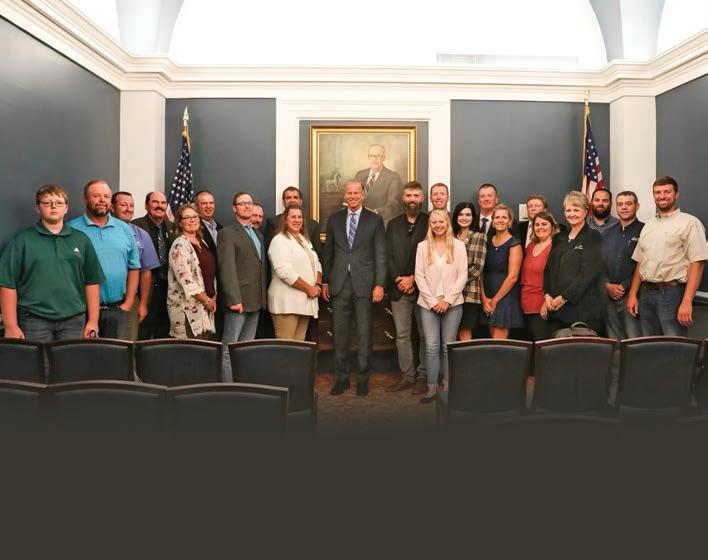
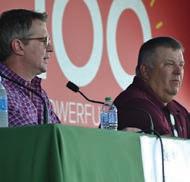
During his Sept. 11 conversation with family farmers and ranchers during the National Farmers Union D.C. Fly-In, Vilsack asked this question: “How many farms have we lost in the United States from the time I left this job the first time I was Secretary of Agriculture in 2017?”
The answer: 16,700 farms.
Policy Meeting
SDFU Celebrates Lyman County Ranch Family

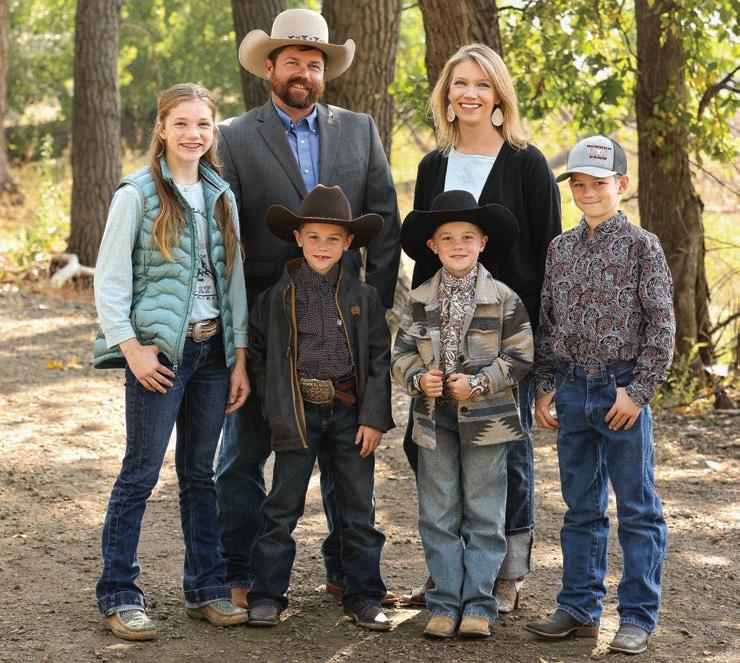
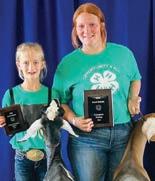
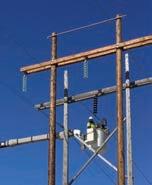

Continued on Page 4
Growing up, Amber (Hammerbeck) Bunker dreamed of becoming a plant geneticist.
“I remember riding in the car with my dad and asking him why there was grass on one side of the road and sagebrush on the other side,” Amber recalled. “He said, ‘girl, you have the right question, but I don’t have the answer.’ I thought I would become the next Norman Borlaug.’”
Borlaug was a Nobel Prize winner known as the father of the Green Revolution.
To find the answers and pursue her dream, Amber majored in agronomy at South Dakota State University.
It was in a genetics class at SDSU that she met Bryan Bunker, a ranch kid from Reliance pursuing a degree in animal science.
Meeting Bryan changed her life in more ways than one.
“I got a B and Bryan got an A. It was then that I decided to admire plant genetics from afar,” Amber said.
Instead of focusing on plant genetics, Amber changed her focus and Bunker Family
Continued on Page 2
A PUBLICATION OF SOUTH DAKOTA FARMERS UNION Farmers Union Day at the South Dakota State Fair PAGE 13 Landowner Rights Focus of State Fair Panel PAGE 18 Volume CVIII, No. 6 Huron, SD SEPT/OCT 2023 SERVING SOUTH DAKOTA’S FARM & RANCH FAMILIES SINCE 1915. Farmers Union Sponsors A Wish PAGE 15
Cooperative Reflects on Legacy Focused on Future PAGE 12
The Bunker family custom grazes cattle near Reliance: Bryan and Amber pictured with their children, Evelyn, Roy, Laird and Si. (Photo is thanks to the talent of Ashley Korzan: www.korzancustomsphotography.com)
Save the Date for 2023 State Convention Nov. 30-Dec. 1
Dakota Farmers & Ranchers Take on Secretary of Agriculture’s Challenge During D.C. Fly-In 2023
South
FLY-IN
Union Farmer
Bunker Family
Continued from Page 1
began looking at ways to improve soil and grassland health.
“I’m a conservationist at heart,” said Amber, who ended up getting her master’s
in plant and soil science with an emphasis in soils.
Although plant genetics were not for her, Bryan was. The couple married the summer after her first year of graduate school.
A few months later Bryan was deployed to Afghanistan. Bryan was an infantryman with the Army for 10th Mountain Division. Bryan said this deployment had a large impact on his desire to return to Lyman County.
“Deployment made me realize that the world is a scary place and I like animals better than humans. Not everyone has the best intentions, whereas animals don’t lie to you,” he said. “While I was deployed I realized I wanted to come home and live in my little world of Reliance, S.D., or at least somewhere else in the Midwest.”
Returning home
Both Bryan and Amber’s families have deep roots in Lyman County.
Amber’s dad, Warren Hammerbeck, grew up on a cattle operation near Iona. And Bryan’s great-grandparents homesteaded near Hamill.

While Bryan’s dad, Mike, built his life and raised Bryan and his siblings on the family’s
Reliance crop and cattle operation – Amber’s dad left home to build a career off the ranch as a chemical salesman, finishing out his career in northeastern Colorado.

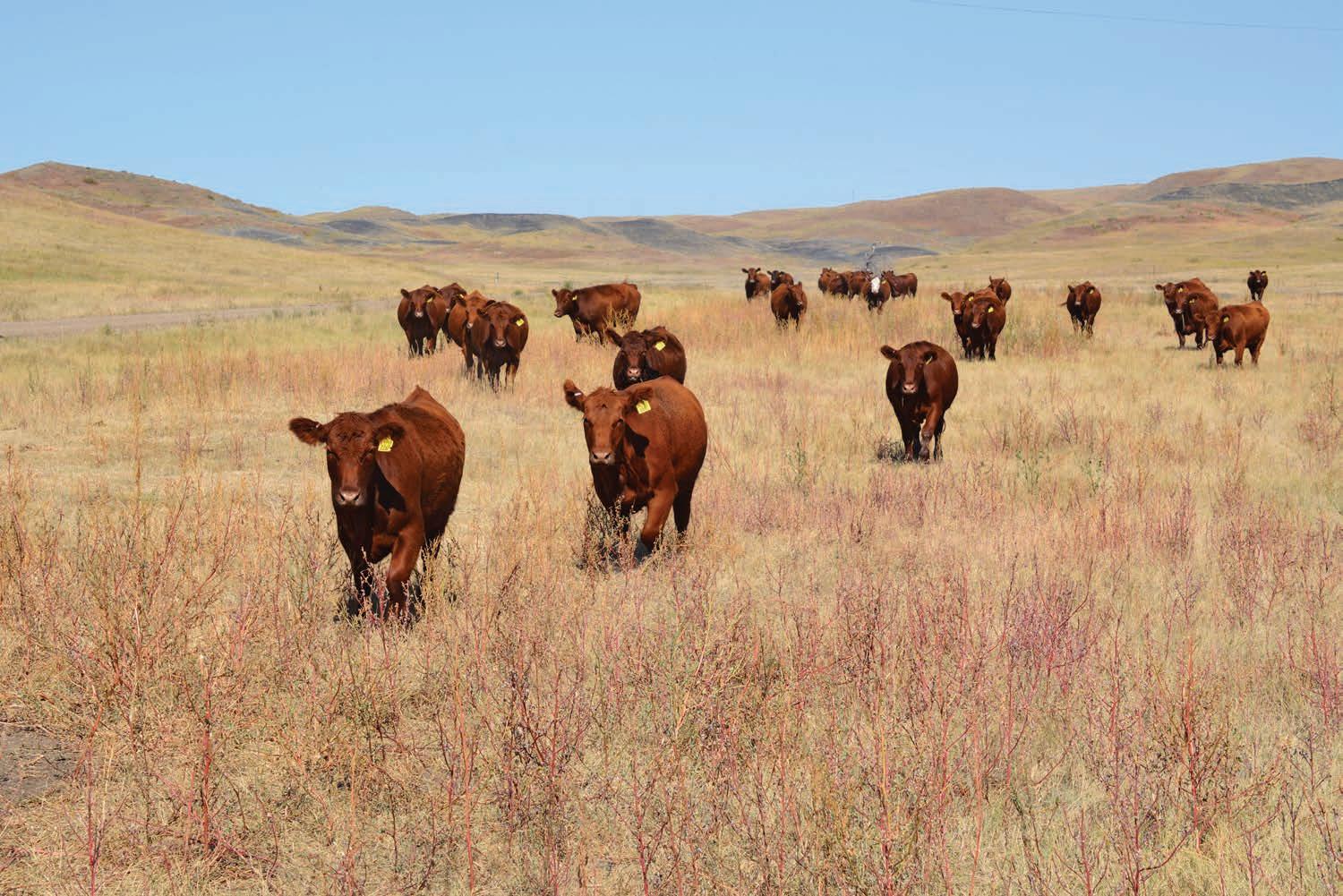
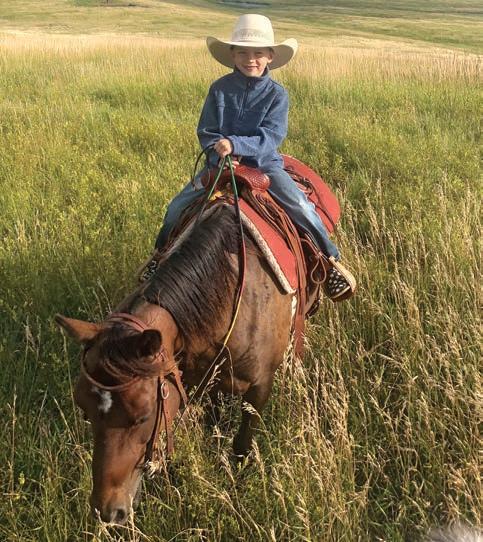
“I was raised by someone who escaped production agriculture,” Amber explained. “My dad’s parents were products of the Great Depression, and they always struggled. My dad helped his parents pay for the ranch over and over again.”
Because of her dad’s experience, it was
DD Double D Western Wear & Tack 800 21st St., Huron, SD 605.352.5792 www.ddwesternhuron.com For the Cowboy In All of Us Farmers Union Members get 20% OFF* one item only! Present this coupon with your purchase *Excludes all boots, shoes, men’s jeans and tack
2 September/October 2023 www.sdfu.org
“I always liked caring for livestock, so the idea of riding horse every day and caring for cattle and cowboying – it is what I always wanted to do.” — Bryan Bunker
difficult for Bryan to convince Amber to return to his family’s operation when his grandma, Skip Bunker, gave him the opportunity in 2014 to run some cattle on her land.
Although she was hesitant, Amber knew it was an opportunity they should not pass up.
“When an opportunity like that knocks, you answer the door,” Amber said.
At the time the couple’s oldest children, Evelyn and Si, were 5 and 2. And returning home to raise cattle was always Bryan’s dream.
“I always liked caring for livestock, so the idea of riding horse every day and caring for cattle and cowboying – it is what I always wanted to do,” he said.
At the time, his grandma, dad and uncle ranched together, but it didn’t take too long to realize that the family operation was not large enough to support four families.
This is when another opportunity presented itself.
“Randy Holmquist found out I was home and asked me if I wanted to lease his place,” Bryan said.
Bryan grew up with Randy’s son, Tyler. So, Bryan understood Randy’s grassland management practices.
Bryan was eager for the opportunity to expand their herd. Again, Amber was hesitant. Although she aligned with Randy’s land stewardship goals, the finances of ranching concerned her.
To help convince her to take on the financial risk, Bryan created profit and loss spreadsheets.
“I told him, if you want to buy more cows, prove to me that we can make it. Show me how it will work,” Amber explained. “He put it all into an Excel spreadsheet and I grilled him. He was able to show me that he thought of all scenarios. So, I said, ’OK on one condition. If we are not making money in three years, we need to sell.’”
The couple made a pact. They signed a three-year lease and Bryan and their son, Si, went to the sale barn to buy cows.
“It was a big day,” Bryan said.
At first things went well. Together the couple enrolled in beefSD a two-year seminar offered by SDSU Extension designed to expose cattle producers to opportunities and information to help them remain profitable.
As a couple, they enjoy working together on the ranch. Amber puts her grassland management knowledge to work while Bryan takes care of the herd.
“Amber takes care of all that is below ground, and I do all the above ground,” Bryan said. “She tells me how to manage the grass from a conservationist standpoint and I use the cows to implement what she tells me.”
By paying attention to the grassland health and intentionally moving cattle, Amber explained they are able to continue the Holmquist legacy of grassland stewardship,

control weeds and increase species diversity.
“Cattle are part of this ecosystem,” Amber said. “The way these native grasses grow, they are triggered by use, how much root mass they put down and biomass they shoot up and whether or not they will go to seed.”
In 2018, there was a drought and as Bryan puts it, “the cattle market tanked.”
True to their pact, the couple knew they needed to sell their herd. But thankfully, this did not mean they had to leave the life they both valued. They had options.
A year earlier, they had been visiting with a beefSD speaker about options and he asked them, “do you have any grass?”
“We looked at each other, other than cattle, all we raise is grass,” Amber said.
The speaker shared with them something they already knew but didn’t think to capitalize on – due to high commodity prices and many marginal acres returning to crop production, there were plenty of cattle producers looking for grass.
Within a few months of selling their herd, they took in their first truckloads of pairs for custom grazing.
“Today, I would call us grass farmers. We grow grass for ranchers to have their cows on,” Amber said.
Bryan added, “we treat these cattle as if they were our own. They drop them off and know I will take care of the rest. I ride
Bunker Family
Continued on Page 8
www.sdfu.org September/October 2023 3 Union
Farmer
“Today, I would call us grass farmers. We grow grass for ranchers to have their cows on.” — Amber Bunker
Union Farmer
He followed up with a second question: “How many acres of farmland were we farming then, that we are not farming today?”
The answer: 6.9 million acres.
And then Vilsack said, “When asked about this the last Secretary of Ag said, ‘you get big or get out?’”
“Are you OK with that? You should not be. Apart from farm families lost, you should also be concerned about small towns. … What is the solution? You need an alternative to ‘get big or get out.’ So, we started thinking outside the box and established climate smart agriculture. We did not wait for Congress to appropriate the money.”
With a white board and marker, Vilsack began to outline how today’s Department of Agriculture is working to help farm and ranch families take new and different approaches to earning profits off their land and livestock. And the funds the department is utilizing do not all come from the Farm Bill. In addition to funds allocated through the Farm Bill, the U.S. Department of Agriculture under Vilsack’s leadership is utilizing funds from the Inflation Reduction Act as well as the Commodity Credit Corporation.
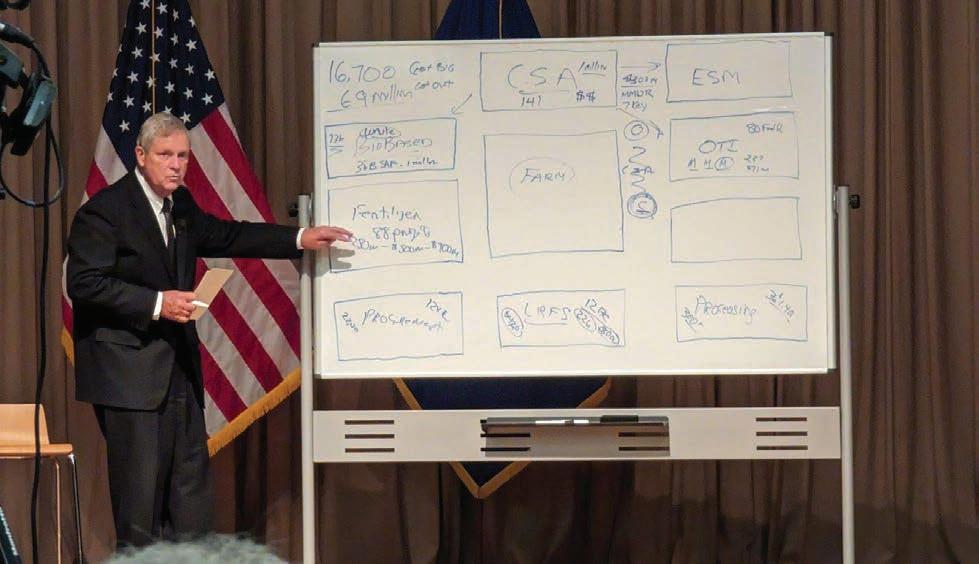
Vilsack’s approach impressed Aberdeen farmer Kirk Schaunaman.
“Many of us are tired of agency leaders doing the status quo,” said Schaunaman, who farms with his brother, Craig. “The creative policy and revenue streams Vilsack
talked about show that he understands how government works. Family farms can’t survive doing what we have always done. The Secretary knows this.”
Parade rancher Oren Lesmeister agreed.
“Vilsack has the background knowledge and ability to communicate with people within government to get things done for us,” said Lesmeister, who along with raising cattle also serves as the District 28-A Representative.
Vilsack ended his talk with a challenge. “It’s up to you.”
It is a challenge many family farmers and ranchers have already embraced, explained Doug Sombke, fourth-generation Conde farmer and President of South Dakota Farmers Union.
“Figuring out how to get things done in spite of challenges is something all farmers and ranchers are good at,” Sombke said. “Our livelihood depends so much on things out of our control – weather, markets, policy.
what they need to see in the upcoming Farm Bill. One ask from South Dakota producers is for Farm Bill funding to be allocated to further research a non-traditional solution developed by Salem farmer Craig Blindert called the Soil Enhancement Tool.
In addition to raising crops and livestock,

I’m proud of the South Dakota family farmers and ranchers who took time away from their operations to share their stories with policymakers.”

Finalizing the Farm Bill and ensuring it contains programs that work for family farmers and ranchers is among the topics that were discussed in multiple meetings with policymakers. During the three-day Fly-In, producers sat down with policymakers from across the U.S. to share their story and ask for
Blindert works as an independent crop insurance agent. The Soil Enhancement Tool is an incentive-based, voluntary, crop insurance plan to protect farmers against market lows by encouraging farmers to cut back on production by taking marginal acres out of production when commodity markets drop.
Along with research funding for Soil Enhancement Tool, Farmers Union members asked policymakers to increase oversight to support transparency in the livestock markets and strengthen enforcement of the Packers and Stockyards Act.
“Policymakers learn more from hearing from the people impacted by their policy. If we are not here to tell them what we need, they are guessing,” explained Gail Temple, who farms with her husband, Brad, near Clark. She also serves as District 3 board member.
With the expiration date for the current
4 September/October 2023 www.sdfu.org
Policy Meeting
Continued from Page 1
“Many of us are tired of agency leaders doing the status quo.”
Policy Meeting
on
– Kirk Schaunaman
Continued
Page 5
The Cavenee family raise cattle in Hand County: Mark, Matt and Stephanie.
U.S. Secretary of Agriculture Tom Vilsack
“Policymakers learn more from hearing from the people impacted by their policy. If we are not here to tell them what we need, they are guessing.”
2023 FLY-IN
– Gail Temple
Policy Meeting
Union Farmer
Continued from Page 4
Farm Bill looming, passing the 2023 Farm Bill was also top of mind during meetings with policymakers.
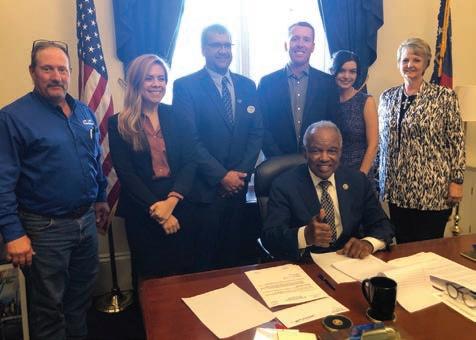
“Until the next Farm Bill is passed, this is an uncertain time for family farmers and ranchers,” Sombke said.
Sombke, Temple, Lesmeister and Schaunaman were among nearly 400 farmers and ranchers from across the U.S. to hear Vilsack’s comments during the National Farmers Union D.C. Fly-In.
They were joined by several other South Dakota family farmers and ranchers: Wayne Soren, Lake Preston; Karla Hofhenke, Huron; Hank Wonnenberg, Dallas; Robert Lee, De Smet; Rocky Forman, Cavour; Jeff Kippley, Aberdeen; Rachel Kippley, Aberdeen; Lance Perrion, Ipswich; Sarah Perrion, Ipswich; Scott Kolousek, Wessington Springs; Amber Kolousek, Wessington Springs; Corey Chicoine; Elk Point; Kathleen Chicoine, Elk Point; Craig Blindert, Salem; Matt Cavenee, Miller; Stephanie Cavenee, Miller; Mark Cavenee, Miller; Tonner Bowman, Mitchell; Samantha Olson, Mitchell; and David Smith, Pierre.
South Dakota Senators Work to Get MCOOL in the Farm Bill
For nearly a decade, South Dakota Farmers Union members have worked tirelessly to get MCOOL (mandatory country-of-origin labeling) re-established.
There is optimism that MCOOL will be part of the 2023 Farm Bill, said South Dakota Sen. Mike Rounds during his Fly-In meeting with South Dakota family farmers and ranchers.

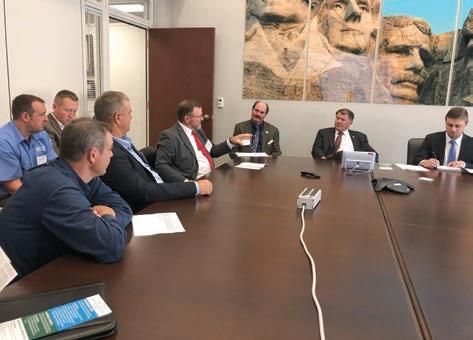
“We have more work to do, but if we could get MCOOL it would solve a lot of problems,” Rounds said.
Sen. John Thune added, “There is opposition, but I think we have a shot in the Ag Committee.”

Amber Kolousek was encouraged by what she heard. Kolousek and her husband, Scott raise cattle and crops near Wessington Springs.
“Not being able to label our beef affects us. Beef is one of a only a few food products not labeled,” Amber said. “Getting MCOOL back is important to having a fair marketplace.”
Scott added, “I want to ensure that we are able to differentiate U.S. beef that I raise from beef imported from Brazil. MCOOL would guarantee this.”
Including MCOOL in the 2023 Farm Bill was among the asks South Dakota Farmers Union members made of policymakers and their staff during their many Fly-In meetings.

“Sharing our story with policymakers is the reason we are here,” Amber said. “We need to see fairness for farmers and ranchers.” n
By Lura Roti for SDFU
Scan this QR code with your phone to view videos of members and media interviews. Or visit www.sdfu.org and click on this article.
 South Dakota farmers and ranchers visit about Farm Bill priorities with Rep. David Scott, ranking member of House Ag Committee.
Sen. Mike Rounds meets with South Dakota Farmers Union members.
South Dakota farmers and ranchers visit about Farm Bill priorities with Rep. David Scott, ranking member of House Ag Committee.
Sen. Mike Rounds meets with South Dakota Farmers Union members.
www.sdfu.org September/October 2023 5
Elk Point farmer, Corey Chicoine shares a concern with USDA officials.
“Figuring out how to get things done in spite of challenges is something all farmers and ranchers are good at.”
– Doug Sombke
2023 FLY-IN
During Fly-In Hill visits, Wessington Springs cattle producer Scott Kolousek visits with a congressional staffer about importance of MCOOL being part of the 2023 Farm Bill.
Ag Advocacy in Action

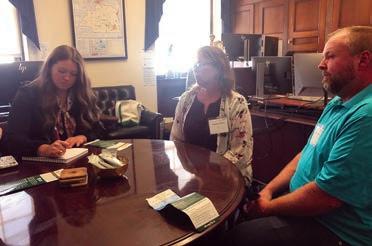
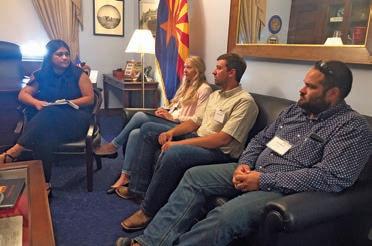
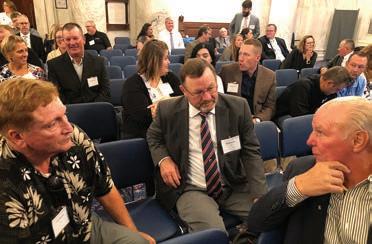
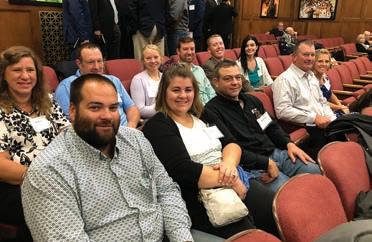
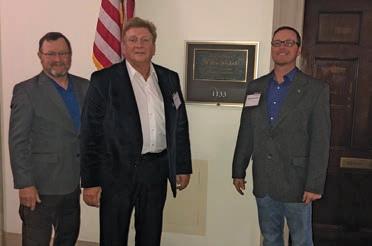

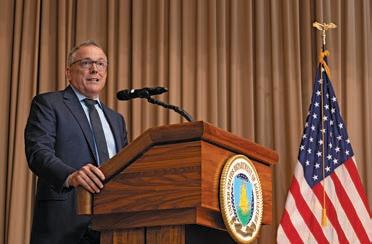

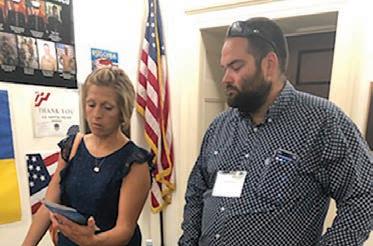
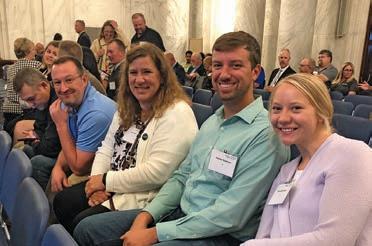
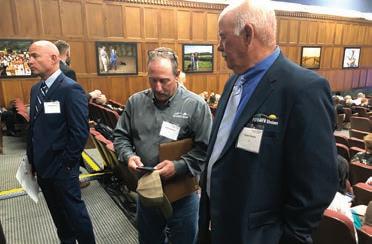

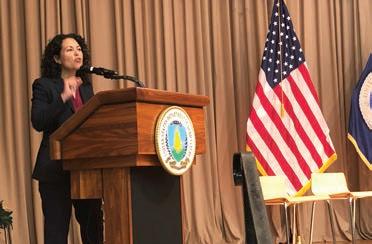
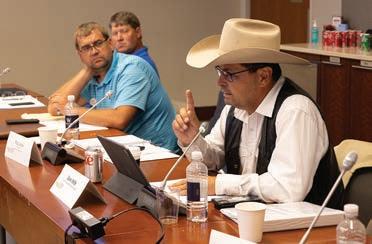
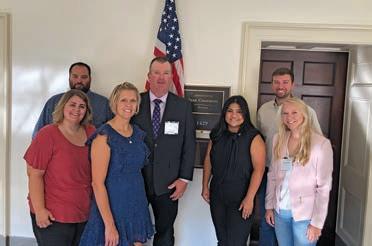
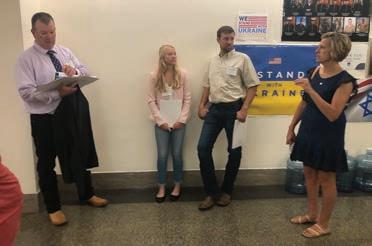

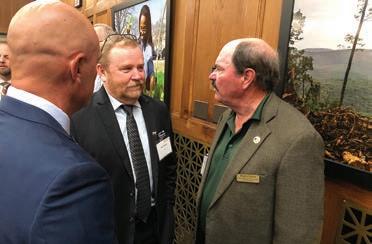

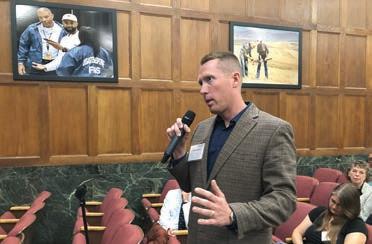
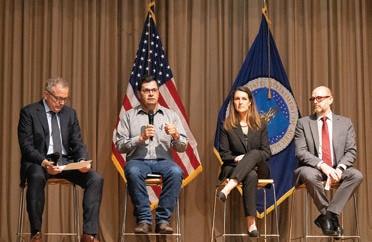
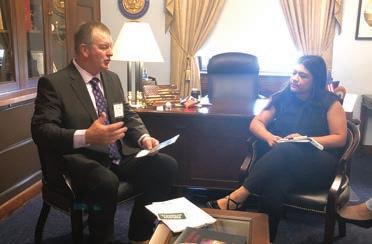
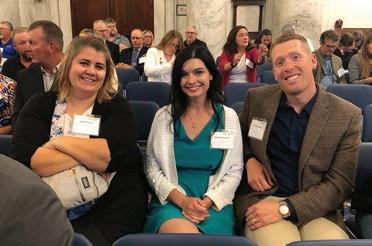
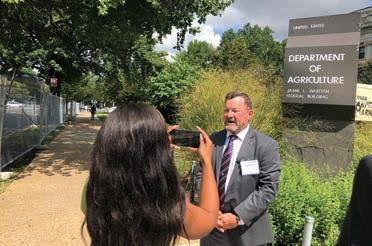



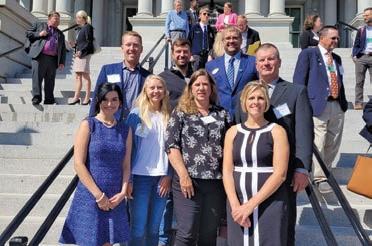
Union
6 September/October 2023 www.sdfu.org 2023 FLY-IN
Farmer
Union Farmer
Matt, Stephanie and Mark Cavenee, Miller

“We want to make sure senators and representatives realize how interested we are in what is going on here. We don’t want to simply be at home talking to our neighbors about what is important to our family ranch, we want to be here talking with the policymakers about what we need and how we can work together to get things done.”
Corey and Kathleen Chicoine, Elk Point
“We wanted the opportunity to tell our story – that’s what this Fly-In is all about. We are also happy we can do this together as a couple because we are both involved in our family operation.”
Craig Blindert, Salem

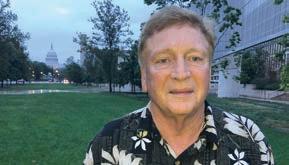
“When it came to developing SET (soil enhancement tool), I looked at the longterm history of prices and how the Farm Bill affected them. Because if you are going to change something, you need to know historically where things came from.”
Oren Lesmeister, Parade
“This is our chance to ask questions face-toface. You can ask a question by email, but it may be ignored. It is difficult to ignore a question when you are standing face-toface.”
Lance and Sarah Perrion, Ipswich
“The Farm Bill affects all farm programs and what assistance is available and safety nets when natural disasters happen. We are here to encourage policymakers to get it done.”
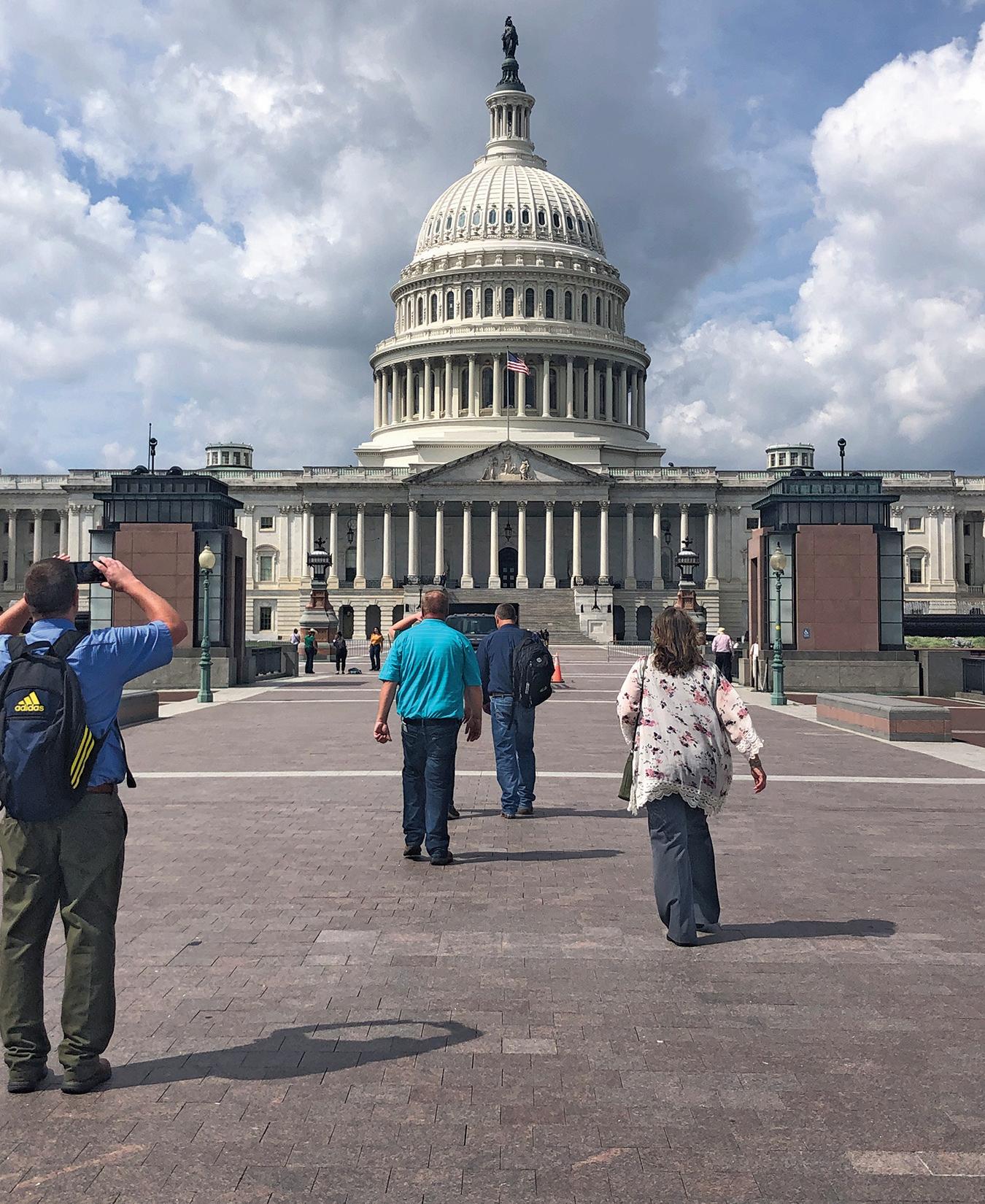
Doug Sombke, SDFU President
“Farm Bill is about security – food security is vital to national security.”
Gail Temple, Clark
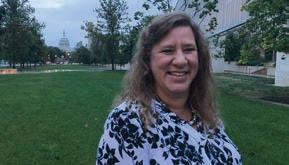
“Policymakers learn more from hearing from people affected by policy. If we aren’t here to tell them what we need, they are guessing.”
Wayne Soren, SDFU Vice President
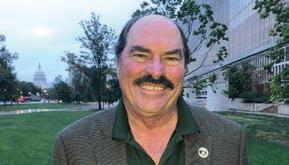
“It is great to see these young South Dakota producers make time for the Fly-In. The Fly-In is a great way to see how the process works and get out of the community where you live and meet with producers from across the nation. Networking with other producers really helps a person understand agriculture on a national level.”
Scott and Amber Kolousek, Wessington Springs
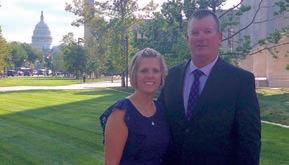
“Sharing our story with policymakers is the reason we are here.”
Hank Wonnenberg, Dallas
“We still have three rural schools in our county. By the time our two daughters are grown and we have grandchildren, I am concerned we will only have one school because farms are just getting bigger and bigger. I am here to hopefully make changes so that small family farms like ours can be sustained.”
Rob Lee, De Smet
“It is important that we meet with leaders from other states, as well as our own, because everyone votes on the Farm Bill.”
Tonnor Bowman and Samantha Olson, Mitchell
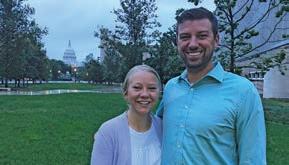
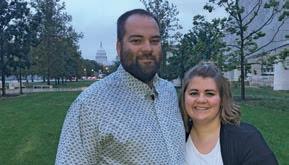
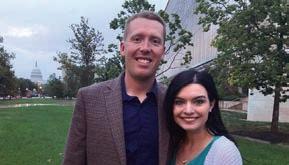
“I think it is valuable to sit down with policymakers one-on-one and give them a direct connection to what is going on in farm and ranch country. This is valuable because farming can be a tough business.”
Kirk Schaunaman, Aberdeen
“After spending this week with our group from South Dakota, I am excited for the future of South Dakota Farmers Union. It is in the capable hands of emerging leaders. The depth of knowledge our young producers shared with policymakers and their staff during the Fly-In was impressive. The questions they asked and commitment to supporting our organization’s policy was outstanding!”

Jeff Kippley, NFU Vice President & Aberdeen farmer
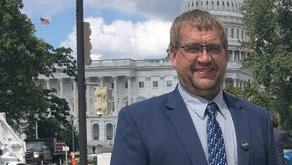
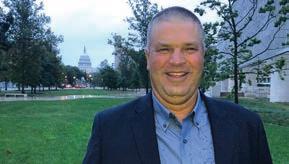
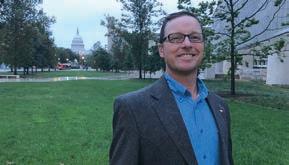
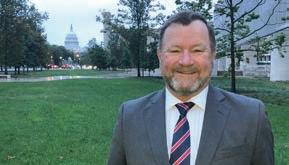
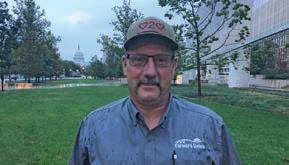
“The timing of this Fly-In is perfect. They have been sitting on a Farm Bill the last six months and have gotten nothing accomplished. Now we have farmers here ready to light a fire under policymakers and let them know we expect to see progress.”
Aaron, Rachel & Moriah Kippley, Aberdeen
“I enjoyed this Fly-In opportunity because it gave me the chance to educate the next generation on what happens in D.C. As we were getting ready to go to the USDA and Capitol Hill meetings, our kids asked why they needed to get dressed up and I said, ‘Even though we are farmers and we may be used to wearing our grubby clothes, it is important to take the time to dress up because it shows that we take this opportunity serious and those in power should take our message seriously.’”

www.sdfu.org September/October 2023 7
South Dakota family farmers and ranchers made time to advocate in D.C. during the National Farmers Union Fly-In. Read on to learn their thoughts.
Union Farmer
Get to Know David Smith
David Smith says growing up on a small farm motivated him to pursue a career in agriculture.
“Agriculture has been in my life since I was 8. It’s the reason I was an active member of 4-H and FFA and it’s the reason I wanted a career in agriculture,” Smith said.
He began his career working for the South Dakota Department of Agriculture and most recently worked for USDA’s Natural Resources Conservation Service. Smith joined South Dakota Farmers Union in June and serves as the organization’s Legislative Specialist.
“I enjoy connecting with farmers and ranchers, but working for government did not allow me to connect with the people I worked with,” Smith explained. “I am happy that in this new role, I will be able to connect with farmers and ranchers. And I can put my background knowledge of agriculture programs, the Farm Bill and agriculture policy to work for South Dakota family farmers and ranchers.”
Smith also appreciates the opportunity to advocate on behalf of grassroots policy.
“Since I began working for Farmers Union, I have been working to support landowner rights because of the CO2 pipeline. Landowner rights is one of the policies our organization supports because farmers and ranchers are the voice of Farmers Union – they set the policy,” Smith explained. “I like getting to support the policy stances of farmers and ranchers.”
Bunker Family
Continued from Page 3
through them a couple times a week.”
When he checks cattle, Bryan prefers riding horse because he feels horses are the lowest stress option for cattle and also horseback riding is a stress-relief for him as well.
“Riding horseback is my therapy for PTSD (post-traumatic stress disorder),” Bryan explained. “There are times when Amber will say, ‘you need to go for a ride.’”
Ensuring Bryan takes care of his mental health following his year of combat is intentional. Bryan’s best friend, Laird, lost his life due to the effects of PTSD.
Making an impact
When Amber reflects on her childhood career goal, she is happy with where she is today – as a professional, wife and mom.
“This is a good place to raise our kids. They have space to breathe and they know what it is to be responsible,” Amber said.
Bryan added, “If they don’t feed
In addition to closely monitoring timely policy issues like landowner rights, Smith will work in Pierre alongside SDFU Lobbyist Mitch Richter and other state staff. He will also research current farm programs and help connect producers with USDA programs and other agency resources.

“There is so much going on right now that impacts family farmers and ranchers. Farmers Union needs to have someone just focused on policy issues and David will do a great job with Farm Bill, landowner rights issues, MCOOL – all the policy issues our members care about,” said Karla Hofhenke, Executive Director for South Dakota Farmers Union. n By Lura Roti for SDFU
something, it could die, and they learn about life and death.”
Once the couple’s youngest children, twins Roy and Laird, were old enough for elementary school, Amber began putting her degree to work off the ranch, working as a District Conservationist for the Natural Resources Conservation Service.
“On the grass pasture that we lease, I know we are making an impact on 4,500 acres,” Amber said. “With my NRCS job, I get to help other people help the land. Like I said, I’m a conservationist at heart.”
In fact, a few years back, it was Amber who convinced Bryan that the ranch was where they needed to stay.
“It was the 2019 calving season and I had 28 bucket calves. I was sick with cryptosporidium and C. diff. The White River flooded and took out a fence we had just put in. It seemed like nothing was going right,” Bryan recalled.
“I always play the long game. I said, let’s do this one more year,” Amber said. “Here, I was the person who said we didn’t need to be here to begin with, but now we were here. Our kids are safe here. We have our village. I told Bryan, I don’t want to rebuild a village.”
When the couple talks about their village, it extends beyond their family and friends in the community of Reliance – they include the cattle producers who trust them to care for their cattle.
“We are willing to work with our producers on rates. I have had some say I could charge more, but I remind them that if they don’t make money, I won’t make money,” Bryan said. “And their feedback that their yearlings are more calm after spending time on grass with us, or that their cattle look great makes me feel good.” n
By Lura Roti for SDFU
8 September/October 2023 www.sdfu.org
Court Rules in Favor of East River Electric, Dismisses Dakota Energy Power Contract Lawsuit
Athree-judge panel of the 8th Circuit Court of Appeals has ruled in favor of East River Electric Power Cooperative, upholding a lower court’s ruling to dismiss a lawsuit brought by Dakota Energy Cooperative seeking to terminate its wholesale power contract early in order to buy power from Guzman Energy, a forprofit, Colorado-based energy broker. The ruling upholds a contractual commitment between East River Electric and Dakota Energy, confirming that Dakota Energy must honor its long-term power contract until its agreed upon termination date of Dec. 31, 2075, and that no provision in the wholesale power contract or East River’s bylaws allows for early termination of that obligation.
“Dakota Energy’s member-owners are the real winners here,” said East River Electric’s CEO/General Manager Bob Sahr. “East River Electric is a not-for-profit, local wholesale power cooperative that has provided dependable energy, some of the lowest rates in the nation and reliable infrastructure to its members for more than 70 years. We look forward to serving Dakota Energy and the rest of our members for generations to come.”
The legal dispute started in November 2020 when Dakota Energy, an electric distribution cooperative based in Huron, S.D., which provides power to areas in Beadle, Hyde and Hand counties, filed a lawsuit seeking to exit its long-term wholesale power contract with East River Electric. Federal District Court Judge Lawrence Piersol in April 2022 granted summary judgement to East River Electric and its power supplier Basin Electric Power Cooperative, dismissing the case. Dakota Energy appealed to the 8th Circuit Court of Appeals. The 8th Circuit Court of Appeals affirmed Judge Piersol’s ruling.
“The courts have spoken clearly twice now – Dakota Energy has not met the legal standard for pursuing its claims,” Sahr said. “The contract stands, and it’s past time to stop wasting member-owners’ money on attorney fees.”
In 2022 alone, East River Electric invested more than $75 million in local transmission projects for its member cooperatives. Over the years they have spent millions in the Dakota Energy territory to respond to growth and provide members with affordable electricity.
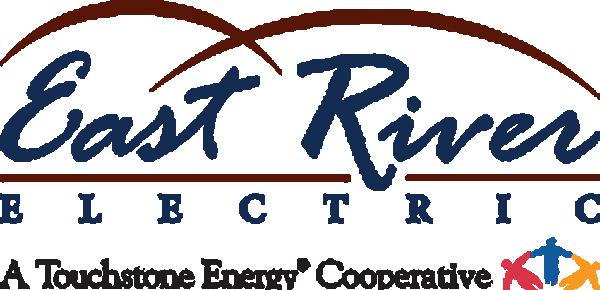
“A lot more goes into the electric utility
business than just buying energy,” Sahr said. “East River’s member cooperatives own us, and our dedicated workforce responds during storms, builds and maintains a reliable transmission network, and supports local economic development all at some of the lowest rates in the entire country. We’re here for the long haul and work only for the members at the end of the line.”
East River Electric is a wholesale power
cooperative headquartered in Madison, S.D., which is owned by and serves 24 electric co-ops and one municipal electric system in eastern South Dakota and western Minnesota. It has long-term power supply contracts with its member systems to ensure long-term reliability and cost control.
“A hallmark of the cooperative business model is members working together to achieve more, as a group, than they can accomplish individually,” Sahr said. “This case is about more than a contract – it’s about a bond and commitment to work together with your neighbors for the greater good. East River’s members set the stage for our historical success when they formed us and our cooperative business model, and working together as a group will be the key to our future success.” n
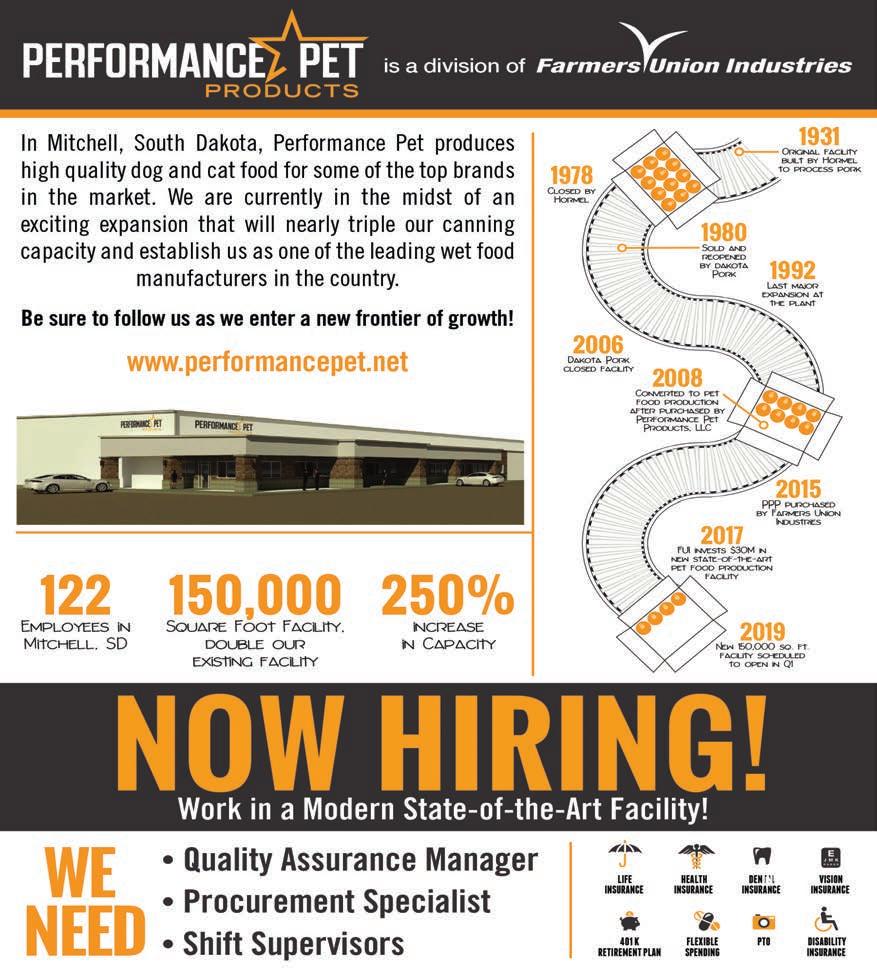
Union Farmer
www.sdfu.org September/October 2023 9
Union Farmer Co-op Month Presentation of 2023 South Dakota Cooperative Hall of Fame Inductees
The South Dakota Cooperative Hall of Fame provides recognition for a person contributing in significant ways to the enhancement of the cooperative idea, its broader acceptance, or to the substantial advancement of cooperative enterprise in any of its various forms. South Dakota Farmers Union thanks these inductees for their contributions. Read on to learn more.
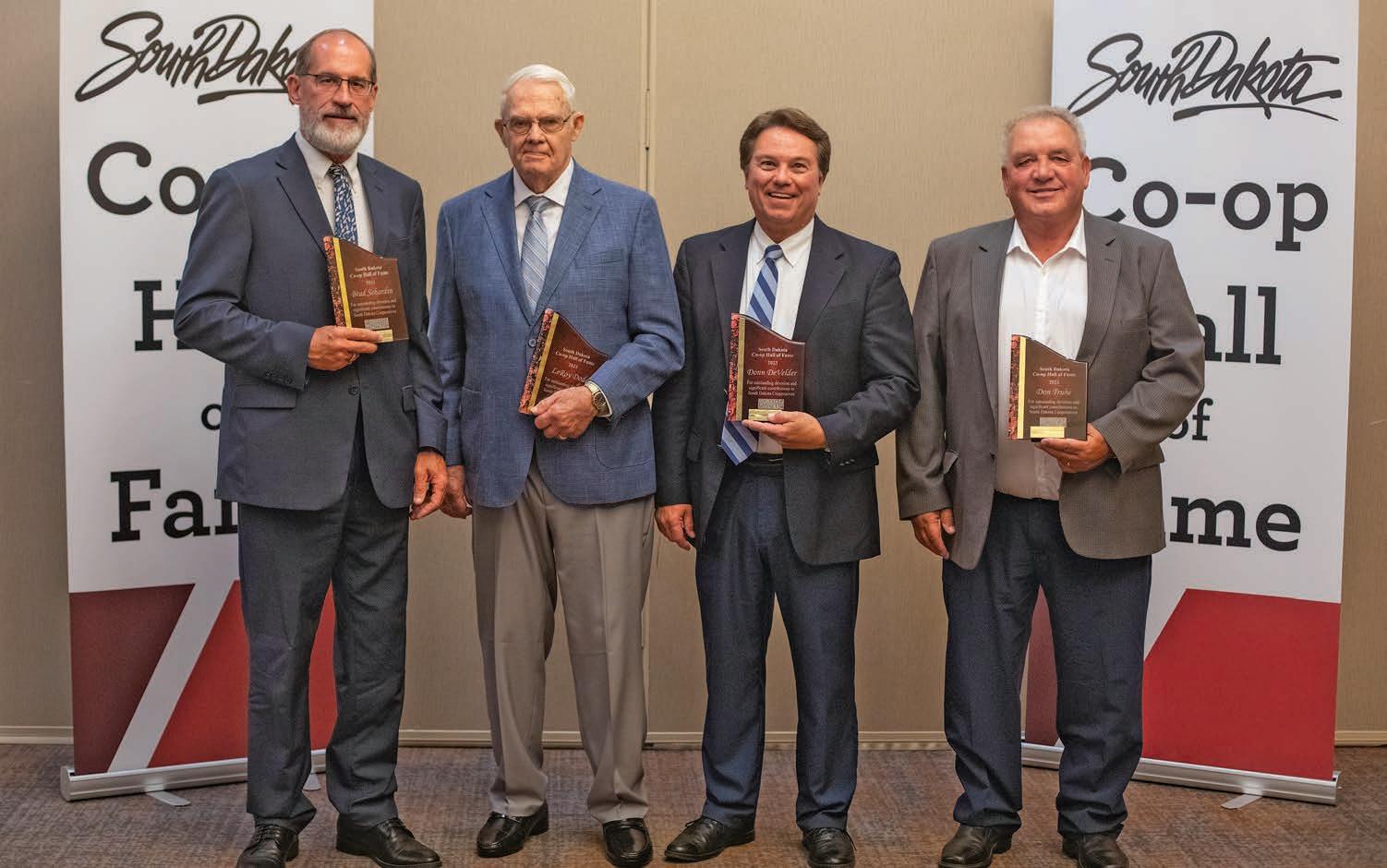
DON TRUHE
When Don Truhe started his career at Farmers Elevator Company in his hometown of Jefferson in December of 1980, his duties ranged from dumping grain to scrubbing the toilet for around 37 cents per hour. Nine months later, the 23-year-old accepted a promotion to general manager. Truhe briefly questioned the board’s decision before deciding he had the gumption to do the job.
It was trial by fire. Truhe persevered
through the farm crisis of the early 1980s, four years of lawsuits related on insurance claims and the collapse of a 60,000-bushel grain bin. These hardships failed to stunt his growing career over the next 42 years. His ability to foresee the changing dynamics of the grain industry resulted in a merger with Elk Point in 1997.
“They were an ‘island’ surrounded by feed mills and shuttle loaders,” Truhe recalled. “We merged for one reason: to build a 110car rail-loading facility.”
Truhe even slept on a folding table at the co-op for 45 consecutive nights to ensure the co-op came out on the other side of the harvest season in fair shape.
“If you don’t run the cooperative like it’s your own, you’re doing it wrong,” Truhe said.
It was his dependable leadership that helped merger discussions move forward
between the South Dakota Grain and Feed Association and the South Dakota AgriBusiness Association. With his help, the unification resulted in South Dakota’s largest association representing retailers in agriculture.
“There is still value in the cooperative system,” he said.
Truhe remained General Manager of Southeast Farmers Cooperative until his retirement last August.
Truhe oversaw tremendous growth while navigating two successful mergers along with making numerous facility and rolling stock upgrades.
“The roots of agriculture run deep, and I am glad to have maintained that tradition for Southeast,” he said.
DONN DEVELDER
Donn DeVelder’s involvement in
10 September/October 2023 www.sdfu.org
2023 Cooperative Hall of Fame Inductees Brad Schardin, LeRoy Dodd, Donn DeVelder and Don Truhe
Co-op Month
Associated Milk Producers Inc. stretches back to the very beginning. Before he began his professional career as an AMPI field representative in 1984, he helped deliver milk from farms to the creamery near his family’s Corsica homestead. The creamery was managed by his father in the early 1970s when it merged with the newly formed AMPI.
In his role as a field representative based out of the co-op’s Freeman location, DeVelder provided on-farm consultation and assistance to the co-op’s dairy farmerowners. During this time spent working directly with AMPI members, he developed a keen understanding of their business and the role their co-op can play in helping them achieve success on their farms.
From the beginning, DeVelder championed co-ops and the importance of dairy farmers owning the manufacturing infrastructure needed to deliver their milk to the marketplace.
In January 2015, DeVelder and Sheryl Meshke were named co-presidents and CEOs of AMPI. The appointment happened at a critical time: the co-op’s cheese packaging plant in Portage, Wis., had just experienced a fire and the dairy industry was experiencing a historic market downturn.
DeVelder and Meshke focused on communications to unite the co-op and began implementing their vision for AMPI. Today, the co-op is the largest farmer-owned cheese company in the U.S., generating about $2 billion in annual sales. DeVelder retired from his leadership position last December.
In addition, DeVelder served in the National Guard for 12 years. He and his wife, Barb, regularly volunteer in the area and are especially committed to supporting young families and increasing accessibility to nutritious food.
LEROY DODD
For two decades, LeRoy Dodd of Mount Vernon proudly represented Santel Communications on the South Dakota Association of Telephone Cooperative Board of Directors as Secretary Treasurer, Vice President and President.
For more than 40 years, Dodd served on the Santel Communications Cooperative Board of Directors and played an integral part of the cooperative’s growth and success.
His involvement began in 1972. Since then, Santel has gone from delivering a simple, dialtone telephone service in Sanborn County to delivering voice, video and broadband service to customers in 11 counties in the east-central
part of the state.
In order to start the transition from a telephone company to a broadband service provider, the entire outside and inside plant network had to be upgraded and replaced.
While the multi-year, multi-million-dollar upgrades occurred, the cooperative launched dial-up Internet and started educating patrons on the value of Internet connectivity.
That foundation shift situated the cooperative well for significant change, growth and continues today, thanks to Dodd’s understanding and exemplification of good local leadership.
He is a man who understands the importance of local leadership and exemplifies it well. He has also served on his township’s board for the better half of the last century.
He has been on his church’s parish council and has enjoyed working with local youth as a Sunday School teacher.
Dodd has an unsurpassed ability to lead others by example and is often the first to volunteer his assistance to meet any challenge or complete any task.
He always gave his help without hesitation or complaint, but with a calm demeanor and smile.
BRAD SCHARDIN
A true advocate of the rural electric co-op industry, Brad Schardin has worked tirelessly on behalf of Southeastern Electric Cooperative to maintain affordable rates and reliable service for its customers.
Schardin has overseen multiple successful
Union Farmer
initiatives and changes while serving as Southeastern Electric’s General Manager.
He oversaw the successful consolidation of Turner-Hutchinson Electric Cooperative and Lincoln-Union Electric Company into Southeastern Electric in 2000 as well as the merger of McCook Electric into Southeastern Electric in 2006.
Regionally, he has served as the chair of East River Electric’s Managers Advisory Committee, as a member of Basin Electric’s Managers Advisory Committee, as president of the South Dakota Rural Electric Manager’s Association and as a member of the South Dakota Rural Electric Association Strategic Issues Committee.
At the national level, Schardin served six years as a manager-director for National Rural Utilities Cooperative Finance Corporation.
His main focus is the cooperative member. His greatest concern is how a decision will affect the member at the end of the line, always asking if it will ultimately benefit members with improved reliability and will be worth the cost.

Schardin holds himself to the highest standards.
Having begun his cooperative career at a small co-op, Schardin has continued to consider effects on smaller co-ops when collaborating with other distribution cooperative managers, East River and Basin Electric, and is likely to speak up when he feels it is necessary.
Schardin lives by the cooperative principle of commitment to community. n
www.sdfu.org September/October 2023 11
East River Electric Power Cooperative Reflects on Legacy Focused on Future
Just a few days ago, Bob Sahr participated in the groundbreaking of a soybean and oilseed processing plant near Mitchell. The CEO/ General Manager of East River Electric Power Cooperative said being a part of a business model that supports rural citizens and their communities is rewarding.
“It’s pretty exciting to be part of large projects and see these projects support local farmers and rural communities,” Sahr said.
He explained East River Electric and its member distribution system Central Electric Cooperative will serve the new Mitchell plant with electricity.
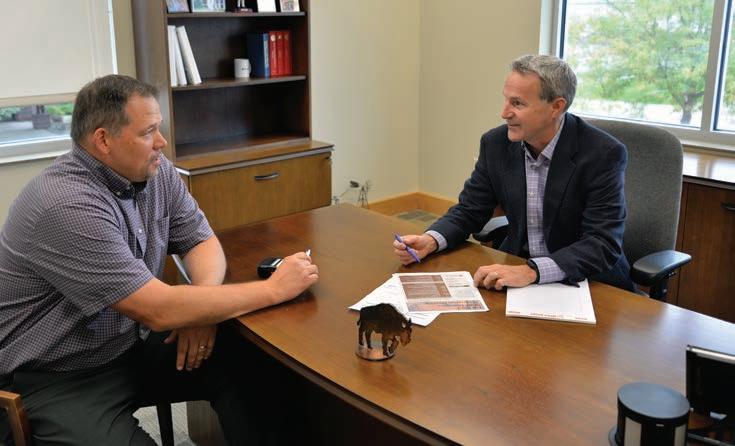
“This cooperative is focused on the future and works to promote economic development because we provide a reliable electricity network,” Sahr said.
Supporting rural citizens and their communities has been the focus of East River Electric since its founding in 1949. Like all cooperatives, it is member-owned. And in the case of East River Electric, its owners are 24 electric cooperatives and the municipality of Elk Point.
In turn, East River Electric Power Cooperative is also part of another cooperative, Basin Electric.
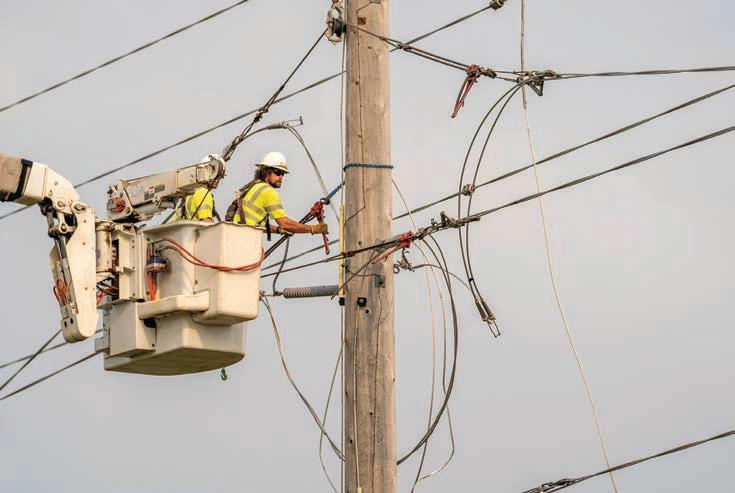
“The entire network, from the distribution network to transmission lines to the power plants, wind farms and solar farms – it’s all memberowned,” Sahr said.
Member ownership is key to the success and relevance of East River Electric.
“We are not accountable to shareholders. We are not elected government officials. Our primary focus is the member-owner – the consumer at the end of the line and doing what is right for these
members,” Sahr said. “This is the reason we work to remain affordable and keep our rates low.”
The focus on doing what is right for the members – not shareholders – is the reason Aberdeen farmer Kirk Schaunaman continues the legacy of cooperative involvement his grandfathers began.
“Since they existed, our family has always been members of a rural electric cooperative,” said Schaunaman a fourth-generation crop and cattle producer who serves on the board of his local rural electric coop, Northern Electric Cooperative.
Before rural electric cooperatives, Schaunaman explained that his grandparents, like most rural South Dakotans, did not have electricity because private providers would not invest in the rural areas.
“My grandfather on my dad’s side was on the board of directors in the 1940s and my grandfather on my mother’s side, contributed to the development of the cooperative,” Schaunaman said. “I found a piece of paper from my grandfather that showed he went around to the neighbors collecting $5 from them to fund the incorporation of the electric co-op.”
Eight decades later, Schaunaman continues the legacy of cooperative leadership. About four years ago, Northern Electric nominated Schaunaman to represent them on the East River Electric Board.
“I believe in the influence members can have in their rural electric cooperatives,” Schaunaman said. “I feel member involvement is important. It’s the benefit of member-ownership. Our electric supply and pricing are not controlled by a private industry that is owned by out-of-state or out-of-country interests. It is controlled by the memberowners.”
In addition to serving on the two cooperative boards, Schaunaman also serves as a South Dakota Farmers Union member representative on the Farmers Union Industries Board of Directors. Because of cooperatives’ support of family farmers, ranchers and their rural communities, for more than a century South Dakota Farmers Union has helped organize and support cooperatives throughout the state.
To learn more about South Dakota Farmers Union, visit www.sdfu. org. To learn more about East River Electric Power Cooperative, visit www.eastriver.coop n
By Lura Roti for SDFU
Co-op Month Union Farmer 12 September/October 2023 www.sdfu.org Kodi Retzer
“We are not accountable to shareholders. We are not elected government officials. Our primary focus is the member-owner – the consumer at the end of the line and doing what is right for these members.”
– Bob Sahr, General Manager, East River Electric Power Cooperative
Danny Brown visits with Bob Sahr, General Manager of East River Electric.
It’s Your State Fair
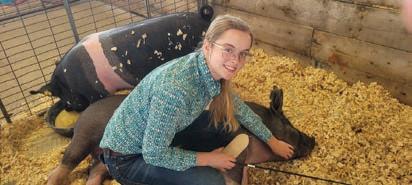
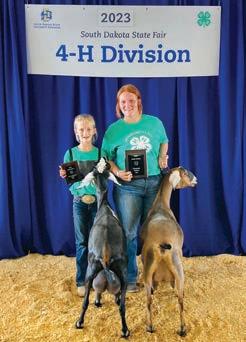
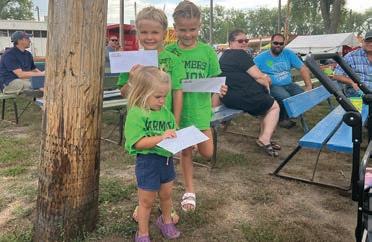
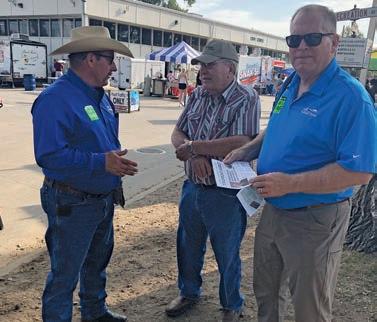
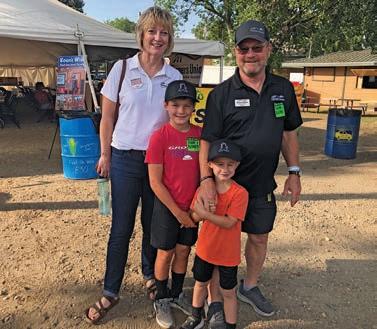


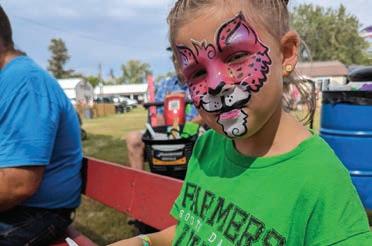
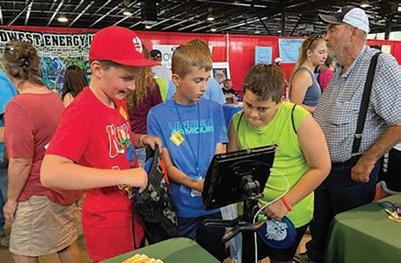
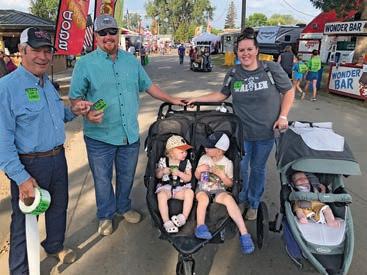
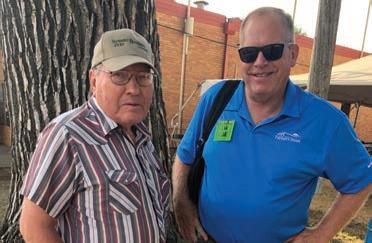
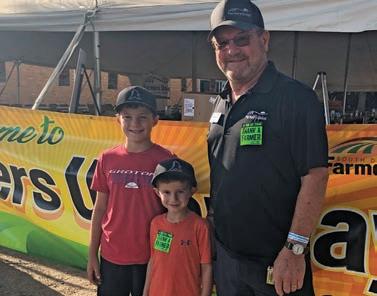
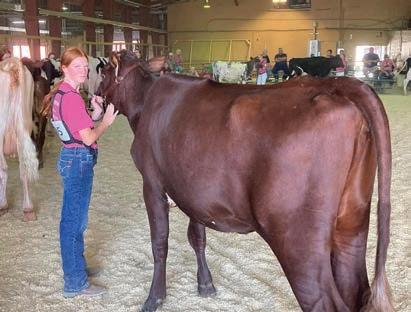
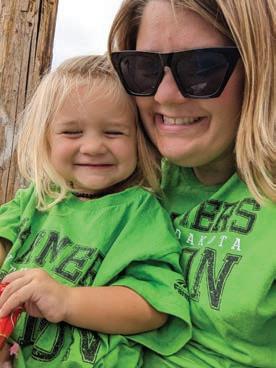
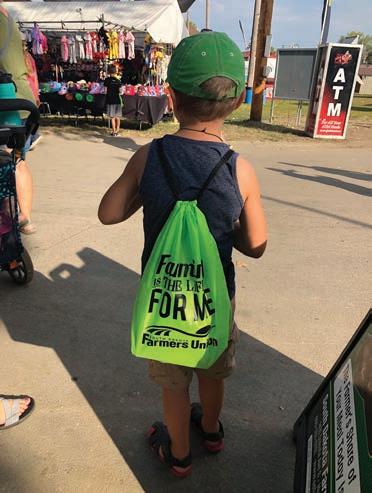


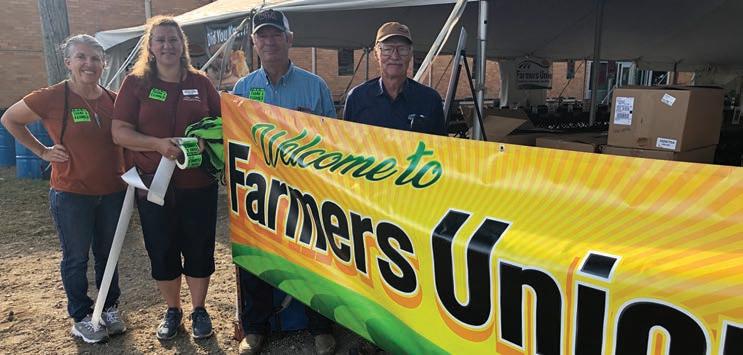
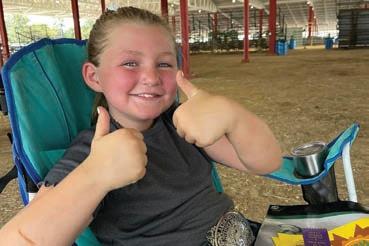
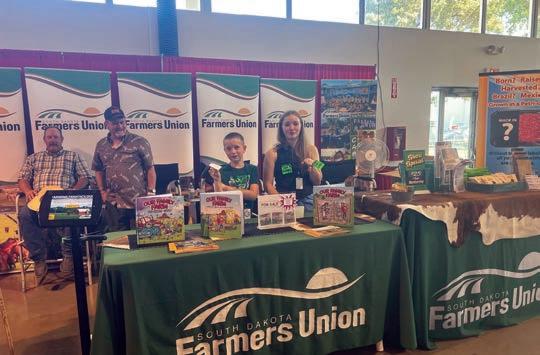
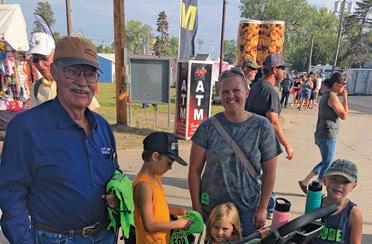

www.sdfu.org September/October 2023 13
Union Farmer
It’s Your State Fair
Platte-Geddes FFA Chapter Wins Farmers Union Farm Safety Quiz Bowl

Teens from Platte-Geddes FFA Chapter were named the 2023 Farmers Union Farm Safety Quiz Bowl Champions on Sept. 2, during Farmers Union Day at the South Dakota State Fair.
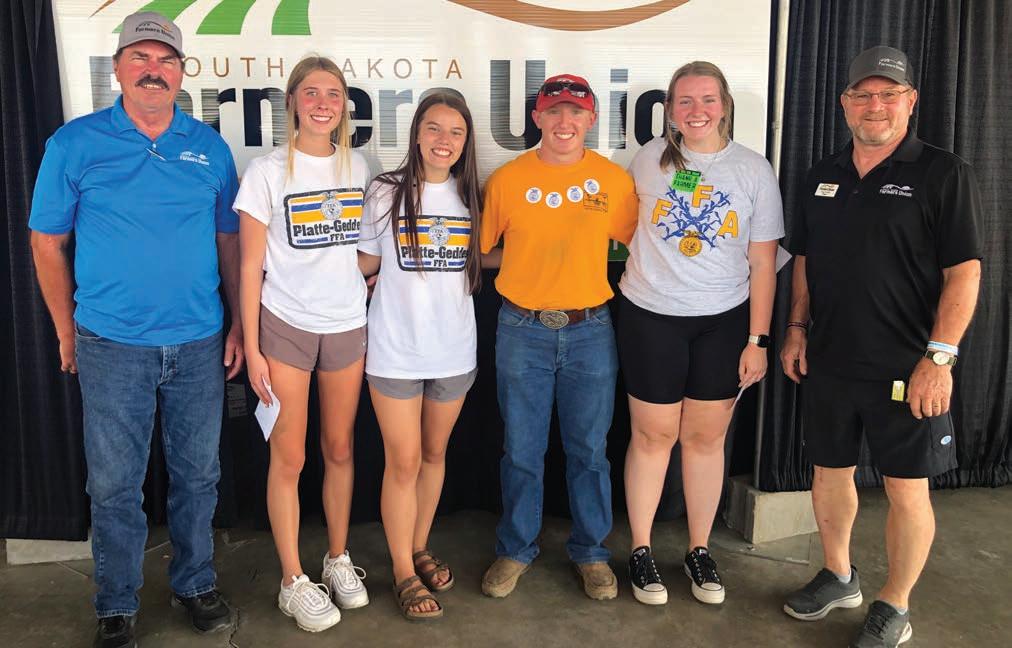
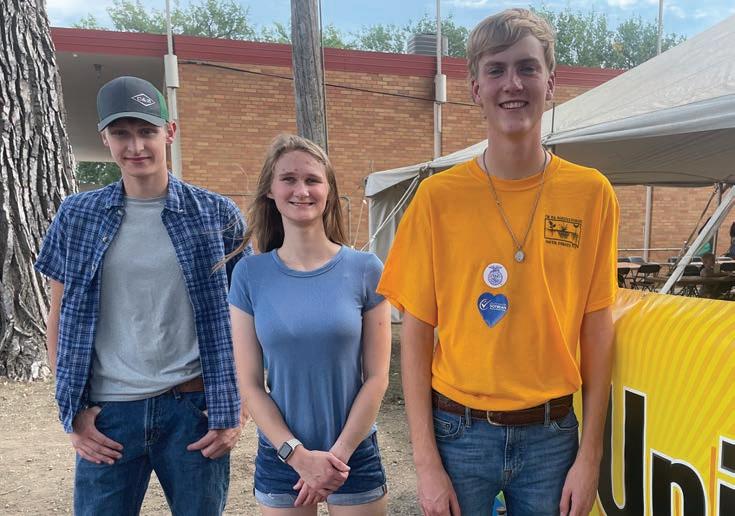
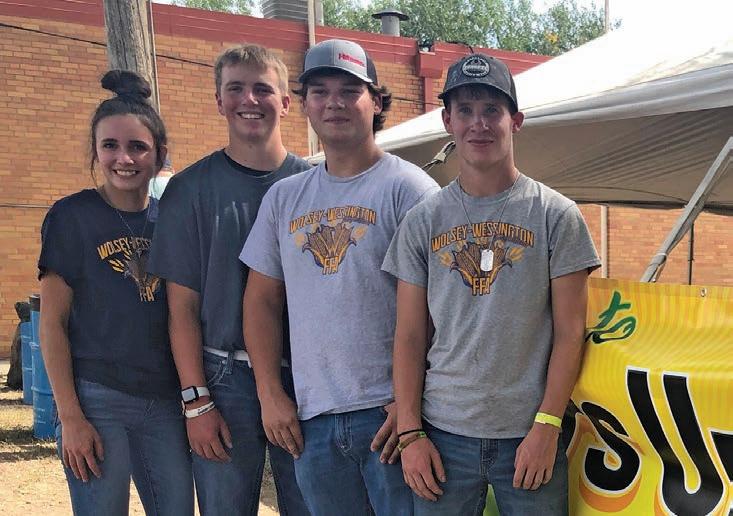
“The contest is a fun way to incorporate farm safety. We were all focused and ready to answer questions,” said Brooklyn Nepodal, a member of the Platte-Geddes FFA Quiz Bowl Team. “Farm safety is extremely important. My grandpa actually gives us demonstrations on how to be safe around our family farm.”
Nepodal competed alongside Natalie Severson, Harper Kirsch and Tristen Petrik. The team qualified for the Farm Safety Quiz Bowl Championships during the State FFA Convention held in Brookings this spring. Other teams to qualify were Gettysburg, Kimball and Wolsey-Wessington. Members of the winning team received a cash prize.
Keeping farm safety top of mind is the reason South Dakota Farmers Union hosts the Farm Safety Quiz Bowl each year, explained SDFU President and Conde farmer Doug Sombke.
“So many South Dakota youth either live on a farm, work on a farm or enjoy time on friends’ farms – this is the reason farm safety is included in all our youth educational programming,” explained Sombke. “Farms and ranches are some of the best places to raise children, but they are also work zones where accidents can and do happen.”
Knowing a child injured in a farm accident is the reason PlatteGeddes FFA Adviser Cayla Graves encourages her students to compete in the quiz bowl each year.
“Kids like competition. They like a good challenge,” Graves said. “If I just assign them something and say, ‘read this article about PTO safety,’ they may read the article, but they do not have a vested interest
Continued on Page 15
Union Farmer 14 September/October 2023 www.sdfu.org
SDFU
Platte-Geddes FFA Chapter named Farmers Union Farm Safety Quiz Bowl Champions. Team members are: Harper Kirsch, Natalie Severson, Tristen Petrik and Brooklyn Nepodal.
SDFU
Gettysburg FFA Chapter Quiz Bowl Team members are: Trace Genzler, Alexis Genzler and Tanner Eide.
SDFU
Wolsey-Wessington FFA Chapter Quiz Bowl Team members are: Kelsie Roberts, Harley Roberts, Keaton Zonner and Ty Olson.
BOWL
Quiz Bowl
It’s Your State Fair
Farmers Union Makes A Wish Come True
During South Dakota Farmers Union Day at the South Dakota State Fair, Farmers Union partnered with Make-A-Wish South Dakota & Montana to adopt a wish for a South Dakota child living with a critical illness.
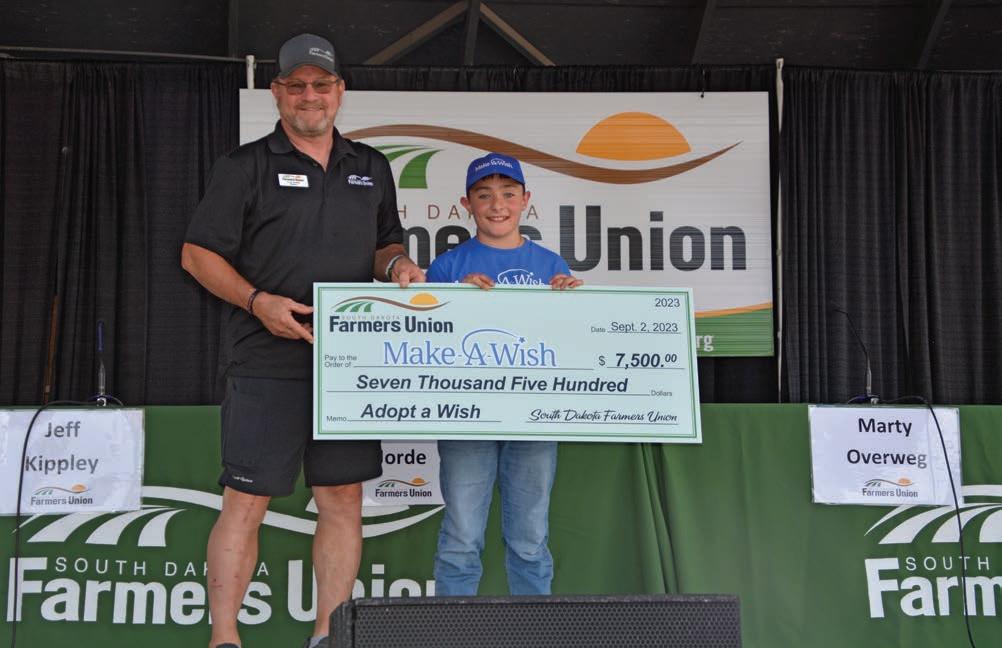
“Make-A-Wish has a special place in many hearts because it supports kids who are experiencing a rough time, dealing with something at their age they should not have to deal with – a life-threatening disease,” said Karla Hofhenke, Executive Director of South Dakota Farmers Union. “Supporting rural youth and families is a focus of our organization. We see sponsoring a wish as a way to make a positive impact in the life of South Dakota youth.”
Koen Spilde accepted the donation on behalf of Make-A-Wish South Dakota & Montana. He is a rural South Dakota farm kid who lives with a chronic respiratory disorder and adrenal insufficiency. These
life-threatening conditions, mean Spilde spends a lot of time at appointments, trending labs and tests, and hospitalized.
In 2021 his Wish was granted. His wish was to transform the waiting room at Avera Specialty Pediatrics with the goal to teach other kids about farm life through an entire experience. The waiting room is now farm themed with an interactive farm board that shows videos from his farm/ ranch.
“I was really happy when my
wish was granted because it was a way to help other kids have fun when they are waiting. Most of the time I’m that kid nervous about appointments and pokes, and I don’t want other kids to feel the way I did in the waiting room,” Spilde shared. “Waiting rooms are boring. There is a TV that you cannot change the channel on and millions of chairs. And you have to sit there for what seems like hours.” n
in truly understanding what it has to say. Competition created by this quiz bowl makes it fun for them to learn and think about farm safety.”
Farm Safety is a Year-Round Focus
In addition to the annual Farm Safety Quiz Bowl, South Dakota Farmers Union also promoted farm safety during the South Dakota State Fair through their interactive Farm Safety Trailer.
During the South Dakota State Fair, hundreds of youth tried on a safety harness while learning about grain bin safety; drove an ATV simulator and learned how to safely drive an ATV and learn about high-risk areas of the farm and how to be safe through the 3-D model farm.
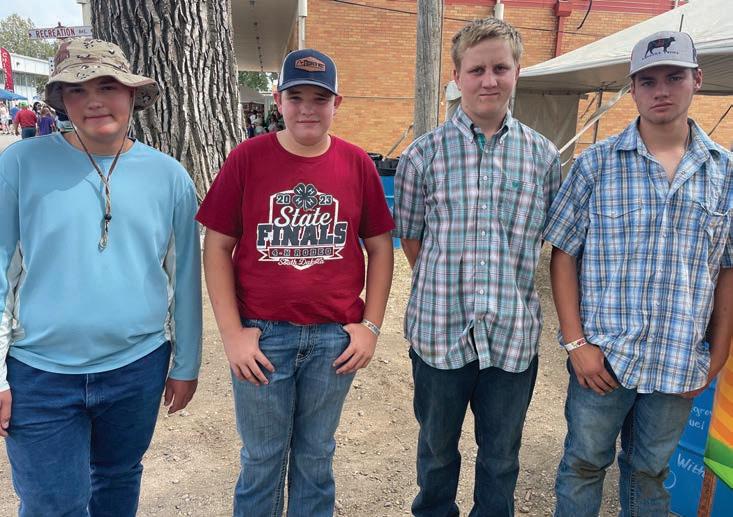
“Kids learn best by doing,” explained Rocky Forman, SDFU Member Services Coordinator. “So, we made sure each safety lesson exhibited in this trailer engages youth in a hands-on activity.”
Thousands of South Dakota youth have visited the Farm Safety Trailer since it hit the road in 2018.
“The hands-on nature of this trailer enhances our educational mission and allows us to provide farm safety education to youth year-round,” said Karla Hofhenke, SDFU Executive Director.
In addition to the Farm Safety Quiz Bowl and Trailer, South Dakota Farmers Union includes farm safety in their summer camp curriculum. To learn more about how the organization serves South Dakota farm and ranch families, visit www.sdfu.org n
Union Farmer
South Dakota Farmers Union President Doug Sombke presents a check to Make-A-Wish. Koen Spilde accepted the check on behalf of the organization that makes wishes come true for South Dakota children living with a critical illness.
SDFU
Kimball FFA Chapter Quiz Bowl Team members are: Blain Mohnen, Synch Ness, Jayden Kott and Luke Leheska.
www.sdfu.org September/October 2023 15
Quiz
Bowl Continued from Page 14
It’s Your State Fair
Farmers & Ranchers Feed 1,000 Fairgoers a 42-Cent Lunch
Even during a year when crop and cattle markets are up, South Dakota’s family farmers and ranchers still earn much less than what consumers pay at the grocery checkout.
To reinforce this fact, South Dakota Farmers Union (SDFU) provided lunch Sept. 2 to South Dakota State Fair attendees for only 42 cents – the price family farmers and ranchers receive for the ingredients.
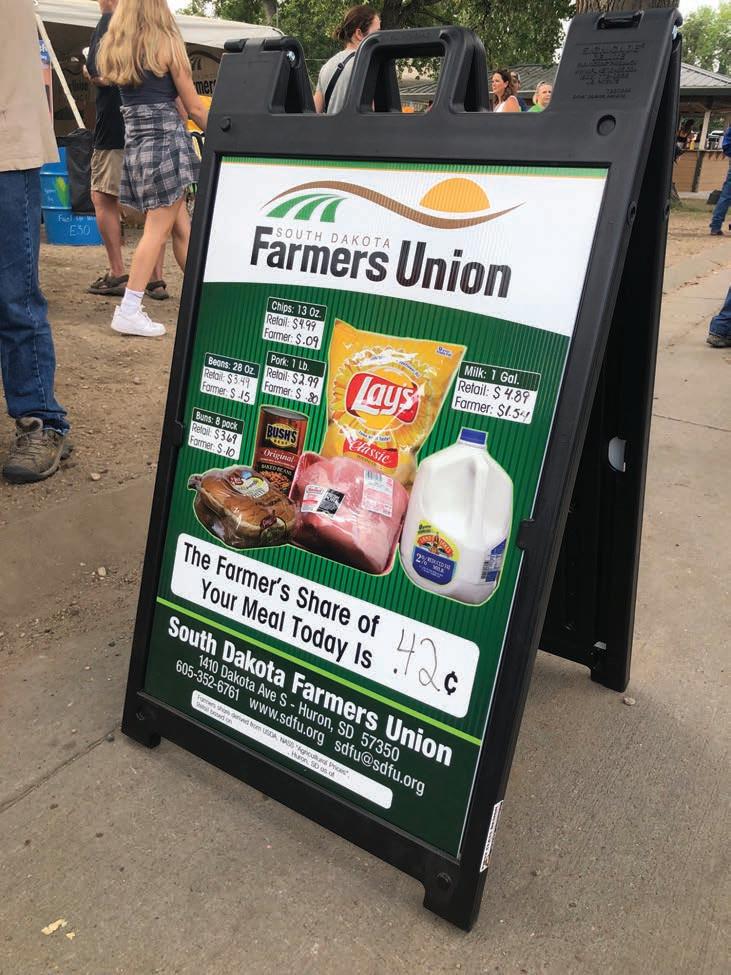
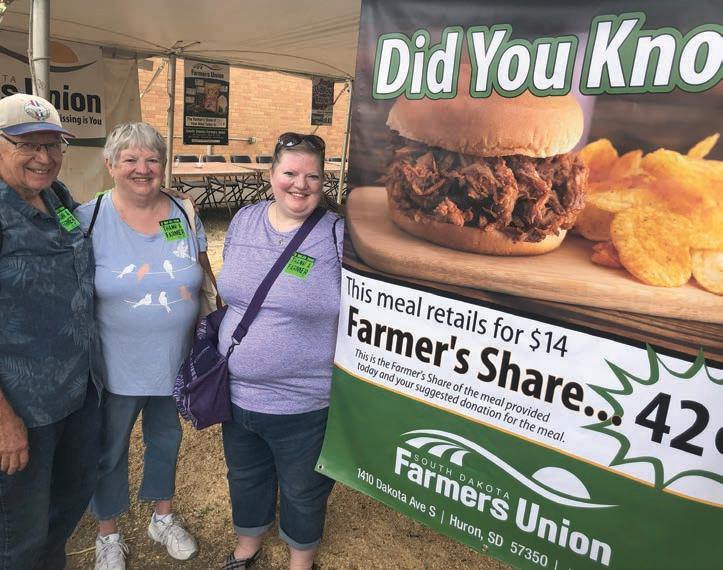
“This nearly free lunch brings to light how much the middleman makes,” said Parade rancher Oren Lesmeister. “The price people pay for a steak at the meat counter is far from the price I receive.
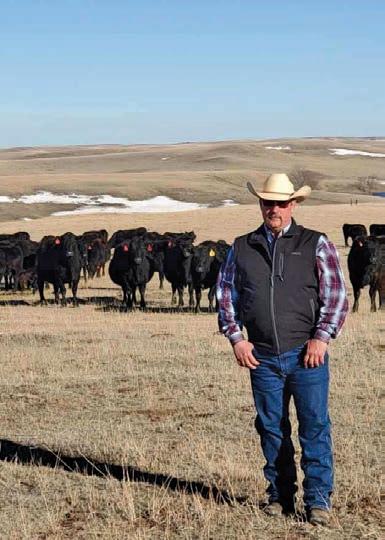
“Thankfully beef prices are up this year, but my family only receives $2.64 for the $9.99 steak sold at the grocery store. And this goes for all commodities we raise here in South Dakota.”
Feeding more than 1,000 fairgoers, the Farmer’s Share Lunch is a long-standing tradition for the state’s largest agriculture organization and premiere sponsor of the South Dakota State Fair, explained Karla Hofhenke, SDFU Executive Director.
“Agriculture is South Dakota’s No. 1 industry and economic driver,” Hofhenke said. “This Farmer’s Share Lunch is one way to help educate all South Dakotans on the economics of raising crops and livestock. We see it as a way to boost support for the South Dakota families doing the work.”
Tracy Solseng would agree.
“Forty-two cents seems very cheap and is a bit surprising because when we go to the grocery store we pay much more,” said the fairgoer from Huron who attends the fair each year with her parents, Elton and Colleen Solseng.
Educating consumers as well as farm and ranch families is a large focus of South Dakota Farmers Union year-round. During Farmers Union Day at the State Fair the organization also hosts Farm Safety Quiz Bowl championships for high school-age youth. It is an opportunity for teens to sharpen and showcase their farm safety knowledge.
“I have seen many farm and ranch families go through loss or injury due to accidents. It’s devastating. This quiz bowl is one of several ways our organization works to promote safety through education,” said Doug Sombke, SDFU President. “And because fairgoers of all ages watch the competition, the Quiz Bowl educates more than youth.”
Teams who qualified were from Gettysburg, Selby Area, Platte-Geddes and Wolsey-Wessington.
SDFU also hosted a landowner rights forum.
Farmer’s Share Lunch
Continued on Page 22
Union Farmer 16 September/October 2023 www.sdfu.org
Elton, Colleen and Tracy Solseng are among more than 1,000 fairgoers who enjoyed the South Dakota Farmer’s Share Lunch.
Oren Lesmeister
It’s Your State Fair State Fair Panel Focuses on Helping the Next Generation Get Involved in Farming & Ranching
Statistics show the average age of a farmer is around 60 years old. This is the reason we needed to do something to ensure young producers can get on the land and are able to farm or ranch.
During the South Dakota State Fair, South Dakota Farmers Union (SDFU) invited experts to discuss options available for young and beginning farmers and ranchers during a panel discussion they hosted: “Getting Young Producers in Agriculture.”
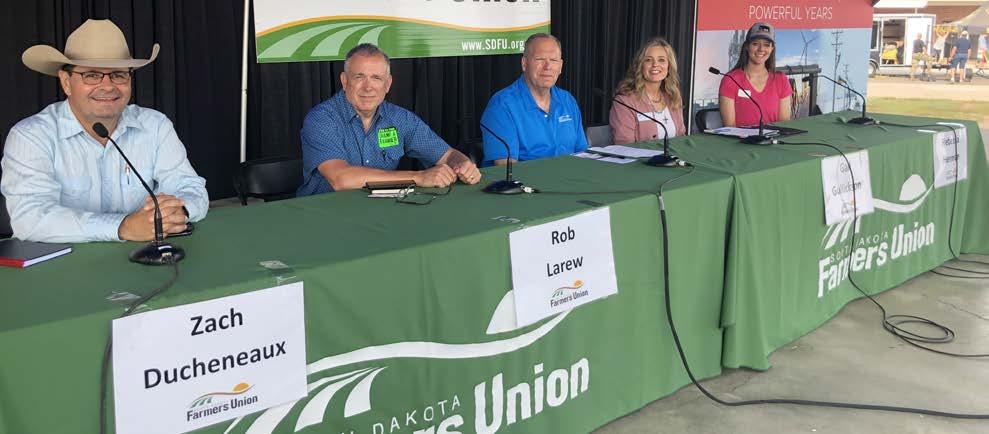
Panelists included Zach Ducheneaux, Administrator for Farm Service Agency (FSA); Rob Larew, National Farmers Union President; Gail Gullickson, USDA Beginning Farmer Rancher State Coordinator; and Rebecca Herman, Field Representative for U.S. Sen. Mike Rounds.
The panel discussion started off with moderator Mitch Richter, Lobbyist with SDFU, sharing another statistic. “Young producers are more likely to work off the farm – about 200 days a year – to make farm finances work.”
In his opening statements Ducheneaux responded to this statistic saying, “When I hear that young producers today are more likely to work off the farm because there is no other way for them to make farm finances work, I think we need to change the way things are so that farmers only work away from the farm if they want to.”
He encouraged new and beginning farmers to engage with their local FSA office, sharing that the average FSA loan out the door is 5 percent and FSA also provides 40year estate mortgages. “There is no better way to do land than FSA,” Ducheneaux said.
Gullickson added that there is no age limit to qualify as a beginning farmer. “When our programs say ‘beginning farmers or beginning ranchers,’ if you have been operating a farm or ranch for less than 10 years, you qualify.”
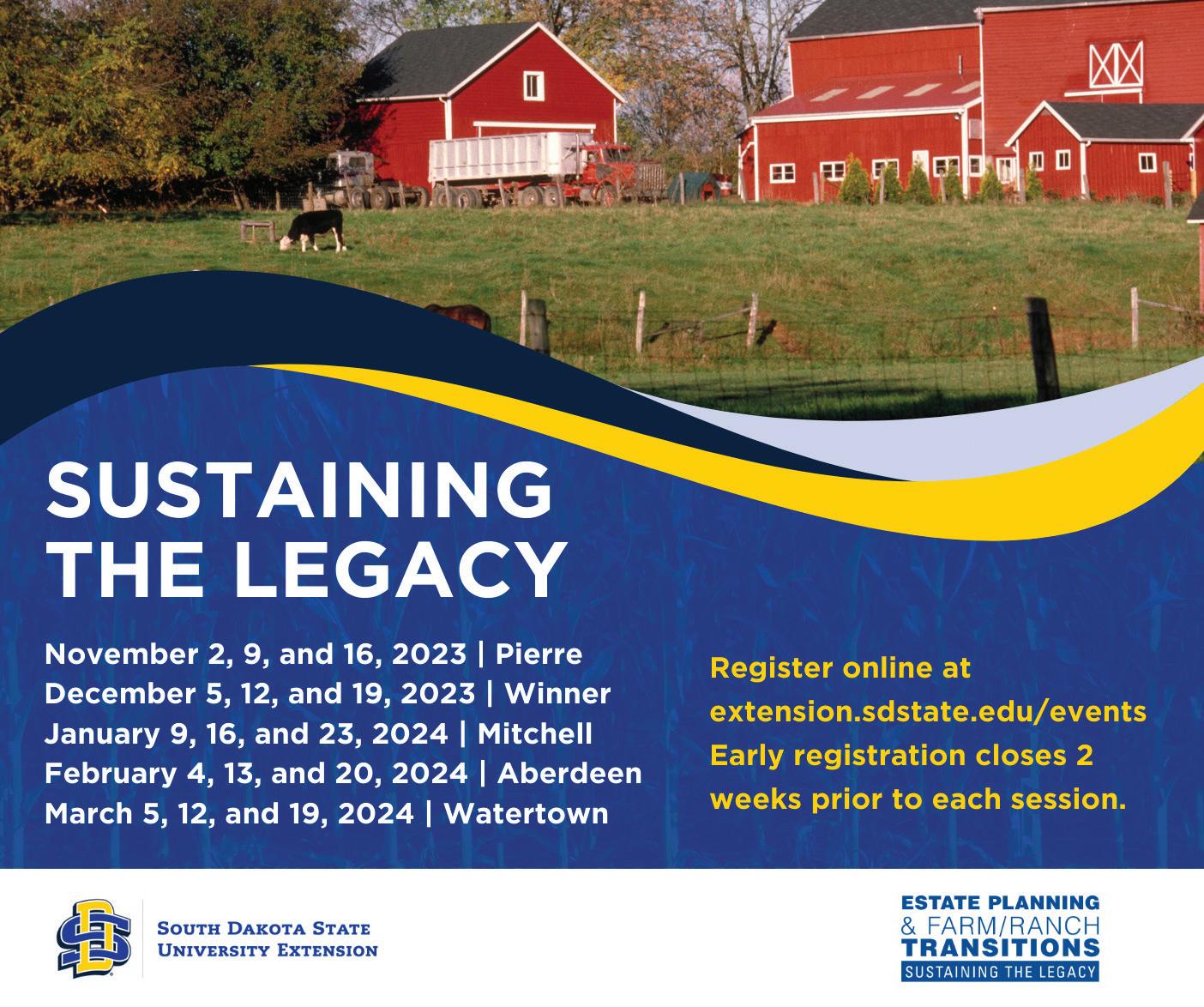
She also explained that there are unique opportunities available for women who farm or ranch.
“I encourage women to get involved in FSA discussions. I know many are as involved in the farm as their husbands, so I encourage wives to come in and ask us about special FSA funding for female farmers because they are a group that has been historically underserved,” Gullickson said. “Or maybe your daughter is looking to take over the
family farm. This last year I was able to help with a cow loan for a daughter who is the next generation on her family’s operation.”
Gullickson also encouraged producers of all ages to keep the next generation top of mind and begin transition planning sooner than later. She reminded fairgoers of programming offered by SDSU Extension for this purpose.
A young producer’s ability to understand
USDA programs and access capital is valuable, but capital and access to capital are part of a larger conversation, said the President of National Farmers Union. “We need to make sure the future for beginning farmers will be a strong one and we begin by answering the question – is the farm marketplace going to
Young Producer Panel
Continued on Page 22
Union Farmer www.sdfu.org September/October 2023 17
Panelists include Zach Ducheneaux, Administrator for Farm Service Agency (FSA); Rob Lerew, National Farmers Union President; Gail Gullickson, USDA Beginning Farmer Rancher State Coordinator; and Rebecca Herman, Field Representative for U.S. Sen. Mike Rounds. Panel was moderated by Mitch Richter, SDFU Lobbyist (center).
It’s Your State Fair
Bipartisan panel urges South Dakota landowners to take sides in private property fight with carbon pipelines
By Caleb Barber, Reporter for the Mitchell Republic , originally published Sept. 5, 2023
Abipartisan panel of representatives at the South Dakota State Fair called on landowners to stand together against corporations seeking easements for putting carbon sequestration pipelines on private land.
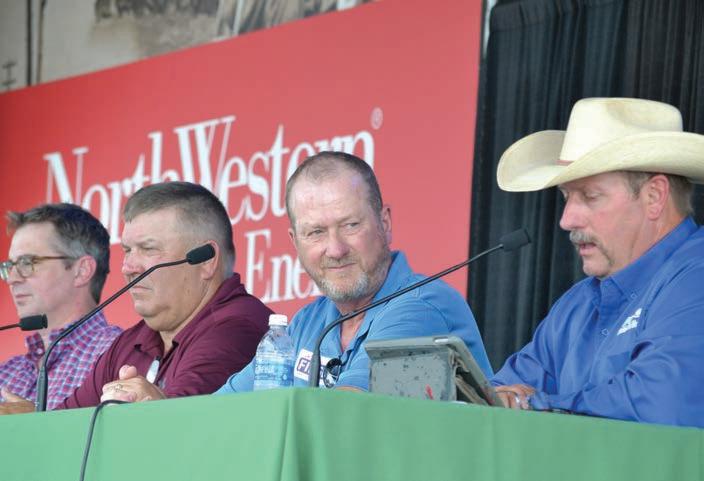
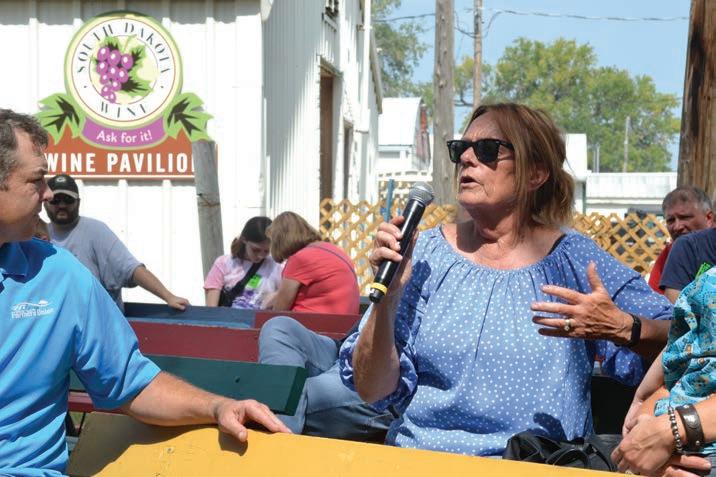
House Minority Leader Rep. Oren Lesmeister, from Parade, and state Rep. Marty Overweg, from New Holland, called for a moratorium on easement negotiations until the next session as a strategy for standing in the way of Navigator CO2 and Summit Carbon Solutions seeking easements from South Dakota landowners.
Both representatives on Sept. 2, agreed that the legislature failed in establishing protections for landowners during the last session. Some form of moratorium wouldn’t be the silver bullet, Overweg said, but the fact that moves for amending the state code, or calling for a special session to amend the code, have fallen flat, is notice for alarm.
Landowner Rights Upheld
On Sept. 11, 2023 Summit Carbon Solutions was denied a permit by the South Dakota Public Utilities Commission with a unanimous 3-0 vote. A week earlier, on Sept. 5 the South Dakota Public Utilities Commission rejected Navigator CO2’s application for a permit to construct the Heartland Greenway carbon capture pipeline.
South Dakota Farmers Union will continue to fight for landowner rights.
Chapter 49 in state law establishes dealing with public utilities and carriers, and is the main area in which legislators looked to amend to require compensation for landowners targeted by pipeline companies.
“We’re working with the (Legislative Research Council) on it, and it’s going to be a huge list because it took 70-80 years to put it together,” Lesmeister said. “We’re not going to pull it apart overnight because it literally touches thousands of chapters of code in our state.”
For that reason, he said, amending the chapter needs to be surgical.
Brian Jorde, the Omaha attorney who has been at the head of the legal opposition to the two pipeline projects, feels good about the decision about to come down from the PUC on the Navigator CO2 pipeline application.
“All we can do is be scrappy, but I put a great team of landowners together,” Jorde said. “The battle is steep uphill, it’s about 89 degrees, not quite 90, but it can be done.”
Jorde, who has led the legal opposition to Navigator CO2’s pipeline application to the South Dakota (and other states) Public Utilities Commission, is about to head to a similar hearing for the application from Summit Carbon Solutions from Sept. 11-22.
South Dakota PUC Commissioner Chris Nelson told the Mitchell Republic in his 14 years on the commission he has never seen an application as publicly controversial as these.
Craig Schaunaman, who farms near Aberdeen, is no stranger to the pressures of claims of eminent domain. But for him, the danger
Amending elements of that chapter, however, has proved difficult.
“We are challenged with trying to pull 49 apart,” Lesmeister said. “There are some bills that I could not vote for in committee, and it tore my heart out.”
Lesmeister said he and other legislators were worried that, by voting for a bill to amend Chapter 49, they would be stifling other pipeline entities that are considered public carriers of utilities.
Carbon Pipeline
Continued on Page 19
Union Farmer 18 September/October 2023 www.sdfu.org
Terry Pritchard of Aurora, S.D., asks the panelists whether a another company might be able to pump material through a pipe in her land if she were to agree to an easement.
Minority Leader of the South Dakota House of Representatives Oren Lesmeister (right) and Republican Representative Marty Overweg (right center) encouraged the audience of a panel on eminent domain and property rights at the South Dakota State Fair to contact their county commissioners and state senators about halting the use of eminent domain by carbon capture companies.
Caleb Barber / Mitchell Republic
Caleb Barber / Mitchell Republic
It’s Your State Fair
OFFICIAL CONVENTION NOTICE
To: All local and county unions of the South Dakota Farmers Union. Notice is hereby given that the 108th annual convention of the Farmers Union Educational and Cooperative Union of America, South Dakota Division will convene on November 30, 2023 at the Crossroads Hotel & Convention Center in Huron, South Dakota at 11:30 a.m. (CT)
Directors from District II, IV and VI and delegates and alternates to the National Farmers Union Convention along with the State President and Vice President will be elected. Bylaw changes will also be voted upon and delegates will adopt a policy program. The Convention will remain in session until disposition has been made of all business.
The South Dakota Farmers Union bylaws provide:
“Each chartered county union in good standing shall be entitled to one delegate for 10 dues-paying members or major fraction thereof. Each county president, if not an elected delegate, shall be a delegate ex-officio to district and state conventions and shall have one vote therein.”
“Credentials must be signed by the president and secretary of the county which such delegates represent and be received by the State Office no later than 5 working days prior to the state convention (November 21), and registered at the venue no later than 8:30 a.m. (CT) on last day of the convention.” The election will be held prior to the first refreshment break on December 1, 2023.
FARMERS EDUCATIONAL AND COOPERATIVE UNION OF AMERICA (SOUTH DAKOTA DIVISION)
Doug Sombke, President
Karla Hofhenke, State Secretary-Treasurer
Early Bird – A policy program will be sent out to any delegates that we receive by November 17th 2023.
of having a perpetual easement on your land far outweighs the value of the compensation offered during negotiation.
Terry Pritchard said she attended the debate on eminent domain in Brookings in August and recalled when Navigator CO2 representative Elizabeth Burns-Thompson said that technically the landowner can negotiate the terms of their easement contract to remove the pipe from their land.
Pritchard said she didn’t buy that.
“Should this company go bankrupt, are you going to have the money to come back and take out a pipe or repair it?” Pritchard said. “I don’t think so.”
She said when she first received a negotiation letter from Navigator, by the first or second paragraph they had already mentioned using
eminent domain as a last resort.
Rep. Jon Hansen from Dell Rapids said during the debate with Burns-Thompson that mentioning eminent domain during this stage can be read as coercion, not voluntary negotiation.
The only element about the easement that could be negotiated in court is the dollar amount of the one-time payment, Jorde said, not the details of the easement contract, nor the resell-ability of the easement.
The message both representatives said the audience should take to heart: “Call your senators. Call your county commissioners.”
“If your county is not involved in this pipeline right now, go home, talk to your commissioners,” Overweg said. “Get your county commissioners to set in some setbacks
and some rules that help protect you, countywise.”
During the Navigator CO2 pipeline PUC hearing, counsel representing Moody and Minnehaha counties both testified as intervenors, stating that the counties they represent passed rules that regulated pipelines, including how close they can be to residences, churches and schools.
The Summit Carbon Solutions pipeline proposal would have the project go through several more counties than the Navigator CO2 pipeline and five counties have already signed up to testify during the project’s hearing.
The PUC is scheduled to make a decision on whether to grant a permit to construct the Heartland Greenway pipeline in South Dakota on Sept. 6. n
www.sdfu.org September/October 2023 19 Union Farmer
Carbon Pipeline Continued from Page 18
Union Farmer

Around the State with Farmers Union Summer Spotlight
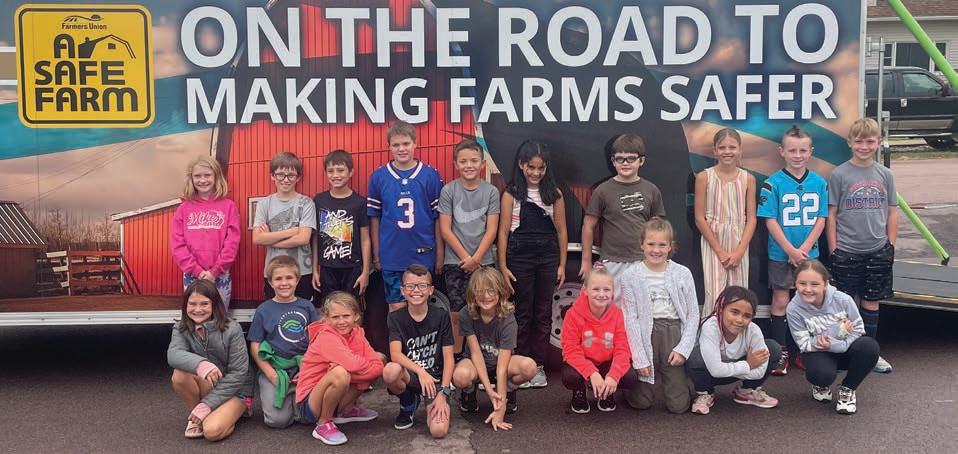

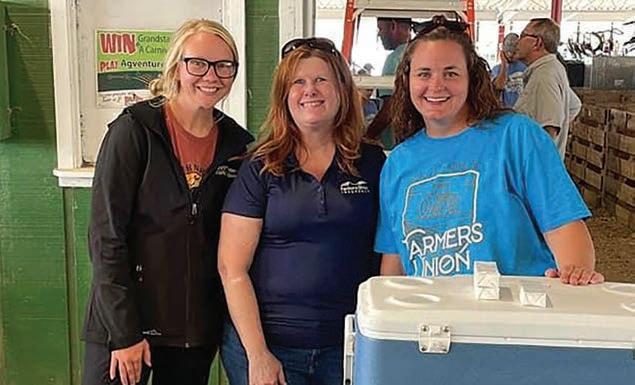
South Dakota Farmers Union members and staff are making a difference in rural communities across South Dakota.
WJLS Ewe Update
Madison Hofer with her ewe, Dolly, that she was awarded by SDFU through the 2022 Herd Builder program during the Western Junior Livestock Show. Dolly had a lamb, Jolene, in March. Madison showed Dolly the Sioux Empire Fair FFA Show and South Dakota State Fair FFA Show. Madison is currently a junior at South Dakota State University majoring in animal science pre-vet.
Ethan FFA Safety Day
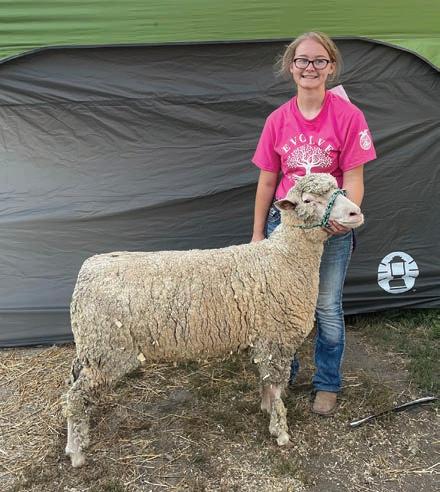
20 September/October 2023 www.sdfu.org
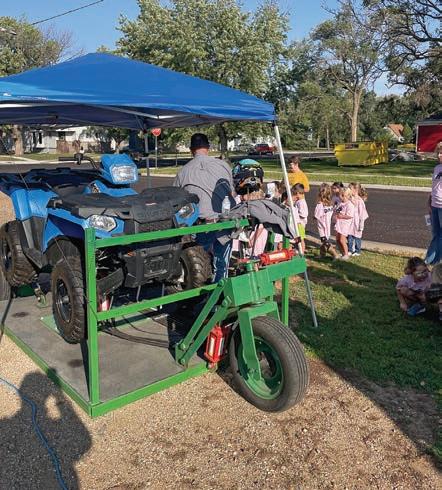
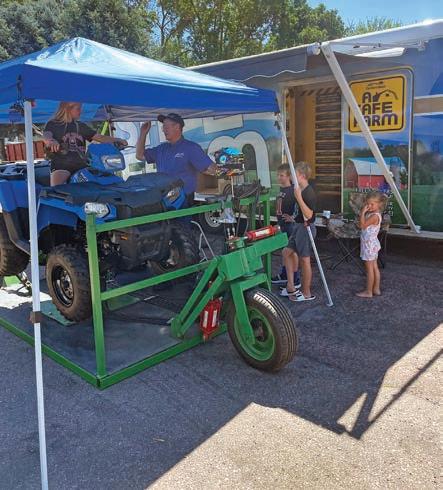
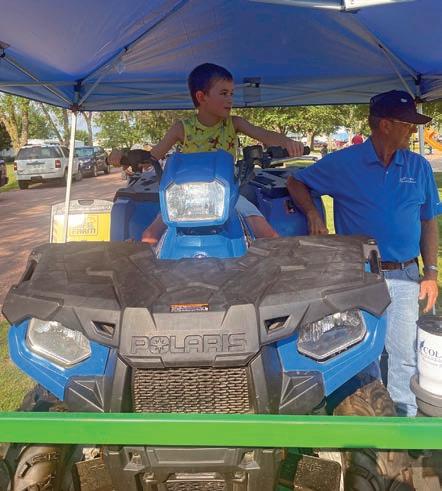
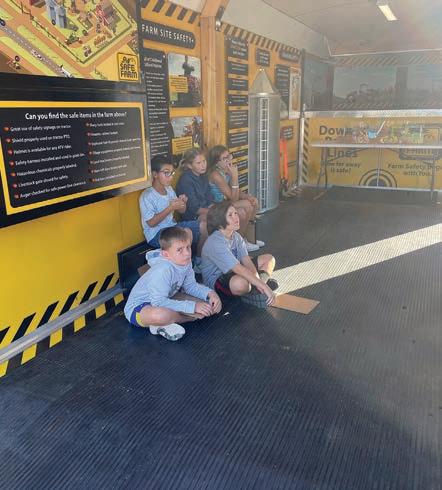
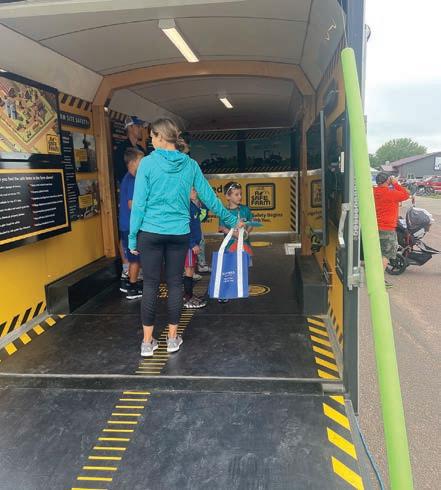
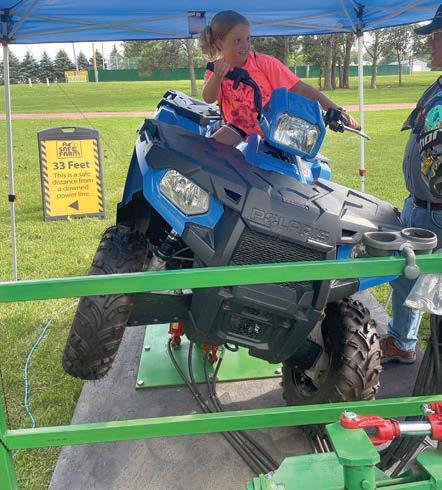
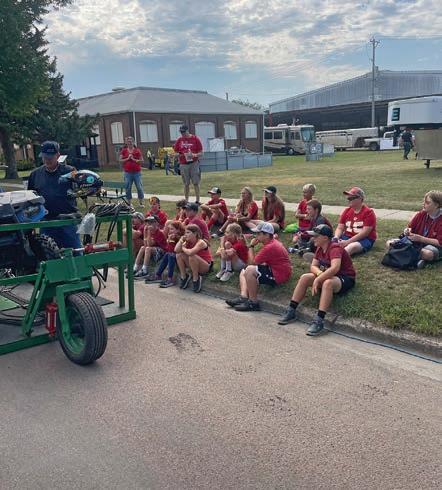
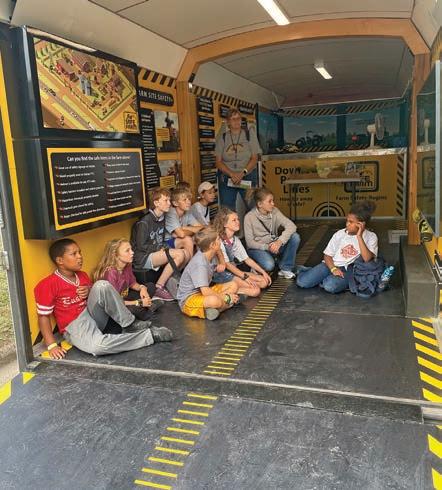

www.sdfu.org September/October 2023 21 Union Farmer Bridgewater FFA Safety Day Clay County Fair Freeman Farmers Market Garretson FFA Safety Day Hartford Farm Safety Day Madison State Fair State Fair Yankton County Fair
Union Farmer
Farmer’s
Share
Lunch Continued from Page 16
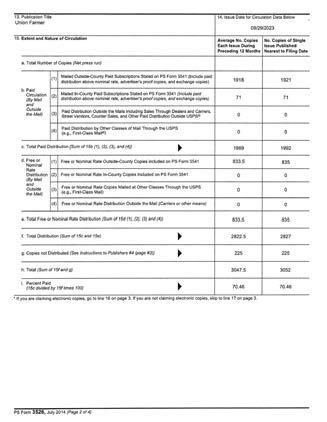
“Landowner rights have been part of our organization’s policy since the beginning because for farmers and ranchers, our land is much more than our livelihood – it is our legacy,” Sombke explained.
SDFU policy is established by its members. “We are not told what our policy is by the national organization. Our policy is developed at the local level based on what is important to our members. This is the definition of
Young Producer Panel
‘grassroots,’” Sombke said.
Landowner rights have received quite a bit of attention in recent months after the private corporation Summit Carbon Solutions began threatening to use eminent domain in order to install its pipeline on private land in South Dakota.
“Threatening to use eminent domain instead of working with landowners is not respecting landowner rights,” said Lesmeister,
Continued from Page 17 be one that will enable them to stay on the farm,” Larew said. “Farm groups like Farmers Union have an obligation to their members and the next generation to talk not just about credit programs and safety programs, but we need to talk about the whole game.”
And the whole game, Larew explained, includes fair markets and a farm bill that supports producers.
“This is a good moment to talk about a concept South Dakota Farmers Union developed that offers environmental protections called IMSET (Inventory Management Soil Enhancement Tool),” Lerew said.
Developed by Craig Blindert, a Salem, S.D., crop and livestock farmer who also works as an independent crop insurance agent, IMSET is an incentive-based, voluntary, crop insurance plan to protect farmers against market lows by encouraging farmers to cut back on production by taking marginal acres out of production when commodity markets drop.
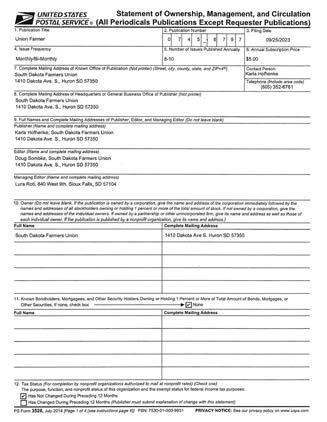
Basically, a farmer’s crop insurance guarantee would go up 2 percent for every 1 percent of land that farmer voluntarily enrolled in a soil enhancement management plan for that growing season.
Policy is involved in most potential solutions discussed during the State Fair panel discussion. And during the discussion
who also serves as District 28-A Legislator.
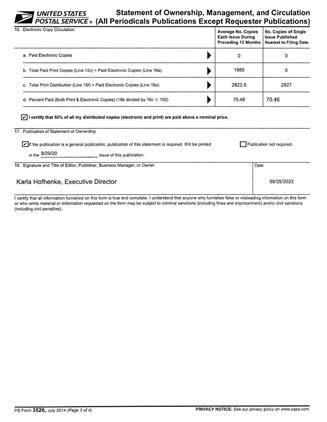
Lesmeister and Sombke were among the South Dakotans to discuss the issue during the public forum. Other forum participants included Aberdeen farmer Craig Schaunaman; Jeff Kippley, Aberdeen farmer and Vice President of National Farmers Union; and Brian Jorde, Managing Lawyer, Domina Law Group.
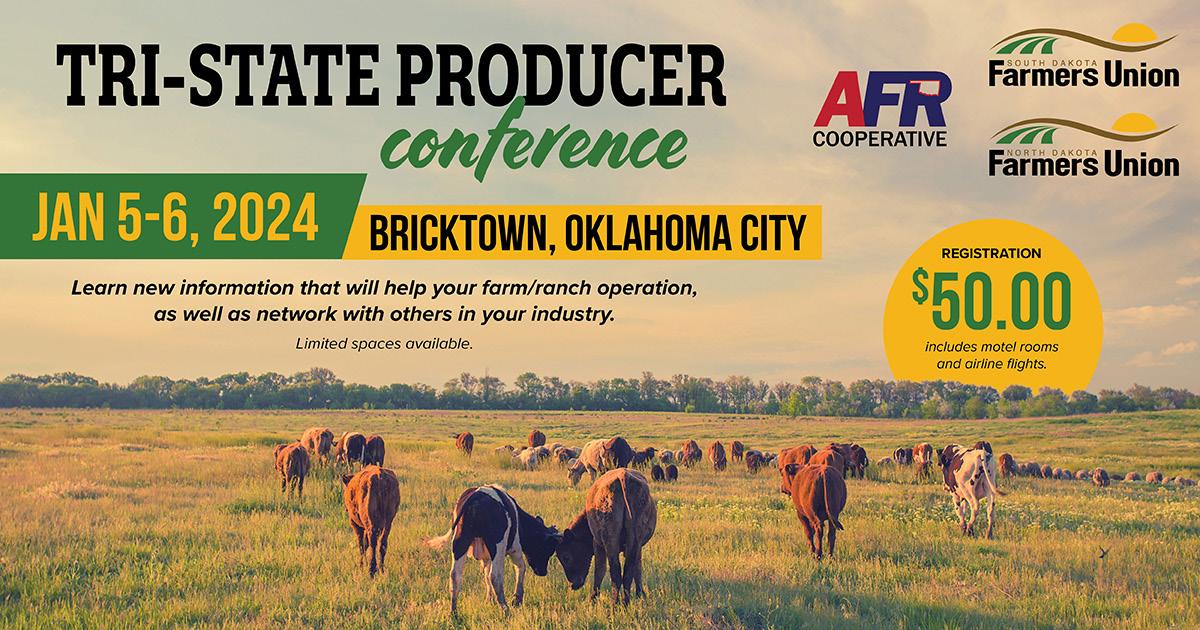
To learn more about the panel discussion turn to page 18. n
the Field Representative for U.S. Sen. Mike Rounds encouraged South Dakota producers to communicate their needs, not only with their local FSA, but directly with Rounds. “We love to get your feedback and help. Agriculture is something we are passionate about.” n By
Lura Roti for SDFU
Contact sdfu@ sdfu.org if you are interested in attending. 22 September/October 2023 www.sdfu.org
View from Our Seat in the Ballpark
Doug Durante, Clean Fuels Development Coalition
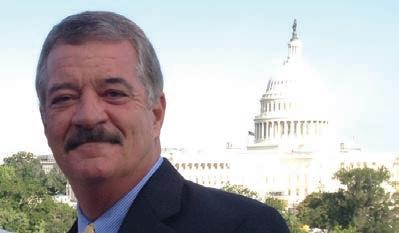
As Congress returns to Washington after fleeing the August heat and humidity for their six-week recess, there are many ethanol issues yet to be resolved. While that is nothing new, it comes at a time when we are once again reminded how we remain at the mercy of OPEC and the oil industry. With a national average gasoline price of $3.75 for regular and premium grades up to a dollar more, it impacts every aspect of our economy. And diesel for much of our farm equipment is similarly exorbitant.
I almost laugh when I hear some people point out that its not that bad considering a year ago gasoline was almost a dollar more. That’s like saying there is a guy hitting me in the head with a hammer but is not that bad, last year he was hitting me with two hammers.
We have the ability to reduce gasoline prices, and the climate, health and economic damages that come with it by using more ethanol. As of this writing, ethanol is close to $1 less than gasoline yet we continue to allow big oil and the EPA to limit the amount we can use. With the constant pressure to reduce carbon emissions, Congress and the administration should be doing everything possible to get more ethanol into the pool.
While Congress will have their plates full when they return in September, they could immediately get behind a bold bipartisan plan to reduce prices and improve fuel quality by establishing a high octane, low carbon fuel standard that has been introduced in both Houses of Congress.
The Next Generation Fuels Act has been introduced in the U.S. Senate by Sens. Charles Grassley (R-Iowa), Amy Klobuchar (D-Minn.), Joni Ernst (R-Iowa) and Tammy Duckworth (D-Ill.) A companion bill has been introduced in the House of Representatives by Iowa Rep. Marian-
nette Miller-Meeks and 27 co-sponsors. This bill supports SDFU’s longstanding support for 30 percent ethanol blends that would increase corn demand at a time when the gasoline market is shrinking and export markets have been overtaken by Brazil.
What makes this proposed legislation potentially game changing is that unlike single issue efforts in the past to address one aspect of ethanol development, this would systematically identify and resolve the range of obstacles we often face. For example, a bill to address the RVP issue might allow higher blends but then be stymied by the fact that (faulty) EPA models claim those blends increase emissions. Or an ethanol high octane standard might be blocked because of arguments that automakers don’t honor warrantees for high ethanol blends. This bill takes on each of these obstacles.
At its core is establishing a high octane, low carbon fuels standard that will increase efficiency, lower consumer costs and protect public health. Here are key elements of this proposed legislation:
• Increases octane of gasoline to 95 RON/E20 in 2028, and 98 RON/E30 in 2033.
• Beginning in 2028 automobile manufacturers required to certify vehicles for emissions and MPG on a minimum of an E20/95 RON, in 2033 to 98 RON/E30.
• Automakers are required to warrant vehicles to those levels at those times.
• Octane additives to gasoline must meet a minimum 40 percent Greenhouse Gas (GHG) reduction.
• Calculation of GHG based on mandatory use of Department of Energy’s GREET Model, which unlike models used by EPA, shows ethanol to be very low carbon.
• RVP Waiver applied to all blends of 10 percent or more.
• Aromatic compounds which refiners add to gasoline to increase octane levels are the primary precursors to the most dangerous pollutants in urban areas, especially particle-borne toxics. Beginning in January 2027, the bill would limit these aromatics to average annual volume of 17.5 percent with a volume cap of 30 percent, after 2032 reduced to 25 percent cap.
• Improves the “F Factor” Utilization Calculations for Dual Fuel Vehicles making ethanol used in FFVs more valuable in carbon calculations.
• Expands emissions testing to include calculations of benzene, fine particulate matter and other precursors, including their role in formation of Secondary Organic Aerosols and other secondary pollutants.
• Various requirements for compatible fuel dispensing systems to ensure these newer, cleaner fuels are used.
For SDFU, which has helped pioneer the use of 30 percent ethanol blends while leading the effort to reduce carcinogens in gasoline, this is validation of everything you have been working for. South Dakota Congressional representatives, while strong ethanol supporters, are not yet co-sponsors of this bill. There have been bills addressing individual issues such as RVP relief, requiring EPA to use accurate emission and carbon models and other measures that the two senators and the House representative have supported. This bill captures all of these issues in one package and SDFU members should encourage their representatives to co-sponsor the Next Generation Fuels Act. n
www.sdfu.org September/October 2023 23 Union Farmer
Union Farmer
ANOTHER SUCCESSFUL FARMERS UNION FLY-IN
From September 11-13, 300 Farmers Union members from across the country joined together in Washington, DC to advocate for NFU’s farm bill priorities. Since 1909, we have gathered in the Nation’s capital to make our voices heard and lobby for a fairer, more equitable food and agricultural system, and this year was no different.
Throughout the week, members attended hundreds of congressional meetings, met with officials from several key federal agencies, and discussed pressing issues with U.S. Secretary of Agriculture Tom Vilsack, USDA Deputy Secretary Xochitl Torres Small, Federal Trade Commission (FTC) Chair Lina Khan, United States Trade Representative Ambassador Katherine Tai, and senior officials at the Environmental Protection Agency and Department of Justice. Members also had the opportunity to raise the issue of staffing shortages at USDA offices across the country and raised this issue with the White House Office of Management and Budget.
FLY-IN KICKS OFF AT USDA
On the Monday morning, attendees arrived at USDA’s Jefferson Auditorium, where they were welcomed by NFU President Rob Larew and NFU’s government relations staff. The team provided some advocacy tips and tricks, along with a deep dive into the pieces of legislation that our member-led legislative committee identified as priorities.
Along with the history of Fly-In and the importance of the conversations that would take place, President Larew also addressed the devastation in Maui and the work that Hawai’i Farmers Union United is doing on the ground, both in connecting residents with food and water, and fundraising for rebuilding efforts.
President Larew welcomed USDA Secretary Tom Vilsack, who presented on the Biden Administration’s efforts to provide farmers and ranchers with opportunities to enter new markets and diversify income streams. Secretary Vilsack outlined various initiatives USDA has undertaken to grow the farm economy “from the bottom up and middle out,” such as revitalizing local and regional food and energy systems; incentivizing entrepreneurship, innovation, and diversification of operation; and ensuring farmers and ranchers can be part of the solution to climate change.
Members had the opportunity to direct questions to the Secretary about issues facing their farms and communities. Following the Secretary’s remarks, members heard from senior USDA officials in two panels: The first on the Marketing and Regulatory Programs mission area, and the second on Farm Production and Conservation.
The speakers on these panels included:
• Jenny Lester Moffitt, Under Secretary for Marketing and Regulatory Programs.
• Mike Schmidt, Senior Advisor.
• Robert Bonnie, Under Secretary for Farm Production and Conservation.
• Zach Ducheneaux, Administrator of the Farm Service Agency.
• Bernie Kluger, Senior Advisor for Management.
• Terri Meighan, Director of Human Resources for USDA FPAC.
The briefing highlighted the strong relationship between Farmers Union and USDA. NFU is eager to continue this collaboration on behalf of family farmers and ranchers for years to come.

COMPETITION AND CLIMATE AT THE WHITE HOUSE
On Wednesday morning, 75 Farmers Union members were welcomed to the Eisenhower Executive Office Building
at the White House, for a briefing with senior White House officials. This annual tradition has served as an opportunity for a two-way discussion for members to learn about the BidenHarris Administration’s priorities and provide perspective on the issues facing family farmers and ranchers across the country.
NFU has been working closely with the White House on several major issues, including the President’s July 2021 Executive Order on competition and the agriculture investments from the Inflation Reduction Act, which have invested more than $300 billion in climate and clean energy initiatives. Roughly $40 billion is devoted to helping farmers, ranchers, and foresters tackle the climate crisis.
Many Farmers Union state divisions and members have been directly involved in the investments, such as the Renewable Energy for America Program (REAP) and Environmental Quality Incentives Program (EQIP), as well as USDA’s Partnerships for Climate-Smart Commodities.
This briefing followed NFU President Larew’s participation on a roundtable discussion with senior White House officials on climate-smart agriculture in early September. NFU looks forward to continuing its work with the Biden-Harris Administration to promote voluntary, incentive-based climate policies and provide farmers and ranchers with the tools they need to address the crisis.
ADDRESSING STAFFING SHORTAGES WITH THE OFFICE OF MANAGEMENT AND BUDGET
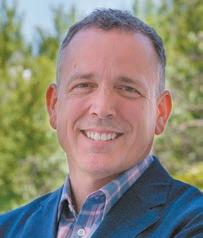
Throughout Fly-In, a key priority of Farmers Union was (and remains) staffing shortages within agencies across USDA, particularly in state and county offices of the Farm Service Agency (FSA).
In 2022, USDA had 5,300 fewer staff than in January 2017. Within FSA, between 2002 and 2018, staffing levels have declined by 33 percent, while the agency now has 2,000 fewer workers than it did in 2006. These staffing shortfalls can cause delays in the effectuation of existing programs and the implementation of new programs, which adversely affects farmers and ranchers who rely on them.
NFU approved a special order of business on the 2023 Farm Bill at our annual convention in March, which included addressing the staffing shortfalls at USDA. In pursuit of this objective, Farmers Union was able to bring members to the White House Office of Management and Budget, which prepares the President’s annual budget proposal to Congress, for a meeting with key officials who manage OMB’s agriculture branch.
USDA and the White House are aware of these staffing issues. Earlier this year, Secretary Vilsack acknowledged structural issues with the USDA’s compensation structure, and that many staff have left for the private sector. The President’s budget request also requested additional dollars to increase staff USDA, including the Farm Service Agency.
NFU Vice President Jeff Kippley led the delegation and presented NFU’s concerns about staffing levels, while expressing a desire for Farmers Union to be a strong partner in addressing this issue. Farmers Union is uniquely positioned to provide on-the-ground, first-hand perspectives and feedback and is eager to work collaboratively to find creative, practical, and workable solutions.
NFU will continue to promote this issue, and as the farm bill reaches expiration and eventual (sooner or later) reauthorization, and work with the White House, USDA, and Congress to address the issue.
TO THE HILL: 2023 FARM BILL TAKES CENTER STAGE
For the “main event” of Fly-In, members voyaged to
the Hill for two days of advocacy and lobbying, with various deadlines facing Congress hanging in the balance. A total of 275 meetings – covering more than half the Hill – between Farmers Union and federal officeholders took place, and members were ready to advocate for the 2023 Farm Bill.
During Fly-In, and presently, NFU’s top priority is ensuring passage of a strong farm bill that ensures Fairness for Farmers by addressing the monopoly crisis in agriculture; strengthens the farm safety net; and helps farmers and ranchers tackle climate change.
“We don’t just need a farm bill – we need the right farm bill. We know that when family farmers and ranchers speak out, decision makers listen.” – NFU President Rob Larew Farmers Union members advocated for establishing a dedicated competition title in the farm bill. Core pieces of legislation within that pursuit include the Meat and Poultry Special Investigator Act, which gives the USDA power to prosecute violations of the Packers and Stockyards Act by meatpackers; the Cattle Price Discovery and Transparency Act, which seeks to fight consolidation in cattle markets by improving price and slaughter reporting and establishing regional minimums for cash trades; the American Beef Labeling Act to reinstate mandatory country-of-origin labeling (COOL); and guaranteeing farmers and ranchers have the Right to Repair their own equipment. The Fairness for Small-Scale Farmers and Ranchers Act increases competition throughout the agricultural supply chain, penalizes anticompetitive conduct in livestock and poultry markets, and strengthens the Packers and Stockyards Act (P&S Act).
Along with efforts to strengthen competition, the farm bill should serve as a safety net for family farm agriculture by strengthening farm programs, addressing the longstanding dairy crisis, bolstering disaster assistance, and expanding risk management tools. Members advocated for authorizing a dual enrollment option for Agricultural Risk Coverage (ARC) and Price Loss Coverage (PLC), to remove uncertainty from the annual program sign-up decision and provide higher levels of assistance. Members also lobbied for the Dairy Revitalization Plan, which would establish growth management in the industry and stabilize prices, as well as for authorizing permanent disaster, as producers facing growing risks from extreme and unpredictable weather.
NFU’s climate priorities include strengthening the farm bill’s conservation and energy titles to provide farmers and ranchers with the critical technical and financial assistance to confront the climate crisis. The COVER Act provides farmers who plant cover crops with a premium crop insurance discount to increase cover crop adoption, which would slow soil erosion, promote soil health, improve water availability, suppress weeds, control pests, and increase biodiversity.
The COWS Act aims to reduce greenhouse gas emissions and improve air and water quality through a voluntary Alternative Manure Management Program. It provides grants and technical assistance for pasture management and alternative manure treatment and storage. The REAP Modernization Act, updates the Renewable Energy for America Program – REAP – to increase the federal cost-share and increase technical assistance for farmers and ranchers who wish to install renewable energy projects on their lands.
Though Fly-In is officially behind us, our members’ advocacy lefts its footprint on the Hill and across Washington. As the farm bill reaches expiration, and though lawmakers still have some time to work with before extension becomes necessary, the Fall Legislative Fly-In served as its loudest rallying cry. n Current as of September 27, 2023
24 September/October 2023 www.sdfu.org
Rob Larew National Farmers Union President
From the President.... Consider Safety This Harvest
It’s harvest! As a farmer this is my favorite season – I’m sure most reading this can relate. Harvest is when we get to see the results of our labor. Crops come out of the fields and calves come off grass.
Harvest is also go time! And this is the reason I urge you to take the time you need to be safe. Take that extra second to check one more time to ensure no one is in the path of your combine as you back up. And when you’re tired and in a hurry, remember to watch for overhead powerlines or the other vehicles on the road who may not be paying attention.
Accidents often happen in a split second. Take a few extra seconds to prevent them.
Farm safety is a focus of Farmers Union educational programming. We invest quite a bit in delivering the message of farm safety to all ages through our Farm Safety Trailer, the FFA Farm Safety Quiz Bowl and our summer camps. The reason? Farm safety aligns with our mission of supporting farm and ranch families so they can be safe and prosperous.
I often talk about policy impacting the prosperity side of things. So, I thought I’d start this column off with a safety reminder.
I’ll be the first to admit, I’m the kind of guy who wants to do two or three things at once. I did not take the time to give much thought to safety until I had grandkids.
It seems seeing the next generation running around the farm helped me get my priorities straight. Because as much as I love spending the day in the field harvesting, it is the people I get to spend my evenings with who are the most important.
The next generation is often the focus of the policy our members establish. At this time, our work to advocate for landowner rights and eminent domain is showing positive results.
This is truly a David over Goliath moment.
And we will continue our policy-driven work during the upcoming Legislative Session to make policy changes that support landowner rights. And we are not in this fight alone. We are among several groups and organizations who make up the South Dakota First Coalition.
Among the strengths of focusing on
Union Farmer
Rep. Dusty Johnson 202-225-2801 / 855-225-2801 reid.rasmussen@mail.house.gov
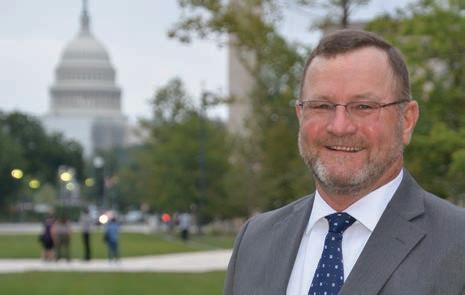

policy, not politics, is focusing on policy provides South Dakota Farmers Union with the opportunity to partner and collaborate with other organizations to do what is right.
Speaking of policy, your voice was heard in D.C. I was so proud of the South Dakota farmers and ranchers who made time for the 2023 Fly-In.
They had the courage to get up and ask questions of USDA officials and Agriculture Committee members. They did not hold back when it came to speaking up for the issues we face with congressional leaders and their staff. They did everything in such a professional manner that our South Dakota group had the respect of all the other states participating in the Fly-In.
When I look at the future of South Dakota Farmers Union, I am optimistic. We are doing what is right and building up the next generation of leaders. And I have full confidence these leaders will develop policy and represent policy that will continue to support the next generation of South Dakota farm and ranch families.
Stay Safe This Harvest
South Dakota Union Farmer, ISSN 0745-8797, publishes seven times per calendar year, with issues printed in January/ February, March/April, May, June/July, August, September/ October and November/December. Periodical postage paid at Madison, S.D.
Karla Hofhenke, Publisher Lura Roti, Editor Wendy Sweeter, Copy Editor Diane Martinson, Layout & Design
All information for publication must be submitted by the 15th of the month. You may submit items to address below or email items to: sdfu@sdfu.org
POSTMASTER: Address changes to: SDFU, PO Box 1388, Huron, S.D. 57350-1388
Contact SDFU • 605-554-3028 1410 Dakota Avenue South, PO Box 1388, Huron, SD 57350 www.sdfu.org sdfu@sdfu.org
SDFU State Office Staff
Doug Sombke ext. 1240 President Groton Direct Line 605-554-3027
Doug Bruckner ext. 1180
Controller Wessington Springs Direct Line 605-554-3026
Rocky Forman. ext. 1170
Member Services Coordinator Huron Direct Line 605-554-3025
Kelli Peterson ext. 1160
Administrative Assistant Huron Direct Line 605-554-3023
Karla Hofhenke ext. 1140 Executive Director Huron Direct Line 605-554-3028
Samantha Olson ....... ext. 1250
Education Specialist Mitchell Direct Line 605-554-3022
Shelby Landmark ext. 1220
Communication Specialist Iroquois Direct Line 605-554-3024
David Smith
Legislative/Farm Specialist Pierre Direct Line 605-350-8857
SDFU Board of Directors
Doug Sombke.........President Groton
Wayne Soren Vice President Lake Preston
Larry Birgen District I
Beresford
Scott Kolousek District II
Wessington Springs
Gail Temple District III
Clark
Congressional Leaders Contact information:
Sen. Mike Rounds Michael Brooks – 202-570-1558 Michael_Brooks@Rounds.Senate.gov
Sen. John Thune 202-224-2321 / 866-850-3855 ryan_donnelly@thune.senate.gov
David Reis District IV Oacoma
Dallis Basel District V
Union Center
Oren Lesmeister District VI
Parade
Chad Johnson District VII
Groton
Contact NFU National Farmers Union 20 F Street NW Suite 300 Washington, DC 20001
Rob Larew, President ~ Jeff Kippley, Vice President
Darin Von Ruden, Secretary ~ Doug Sombke, Treasurer 202.554.1600 www.nfu.org
A PUBLICATION OF SOUTH DAKOTA FARMERS UNION
www.sdfu.org September/October 2023 25
Doug Sombke, President South Dakota Farmers Union
Doug Sombke, SDFU President
Union Farmer
Get to Know Farmers Union Insurance
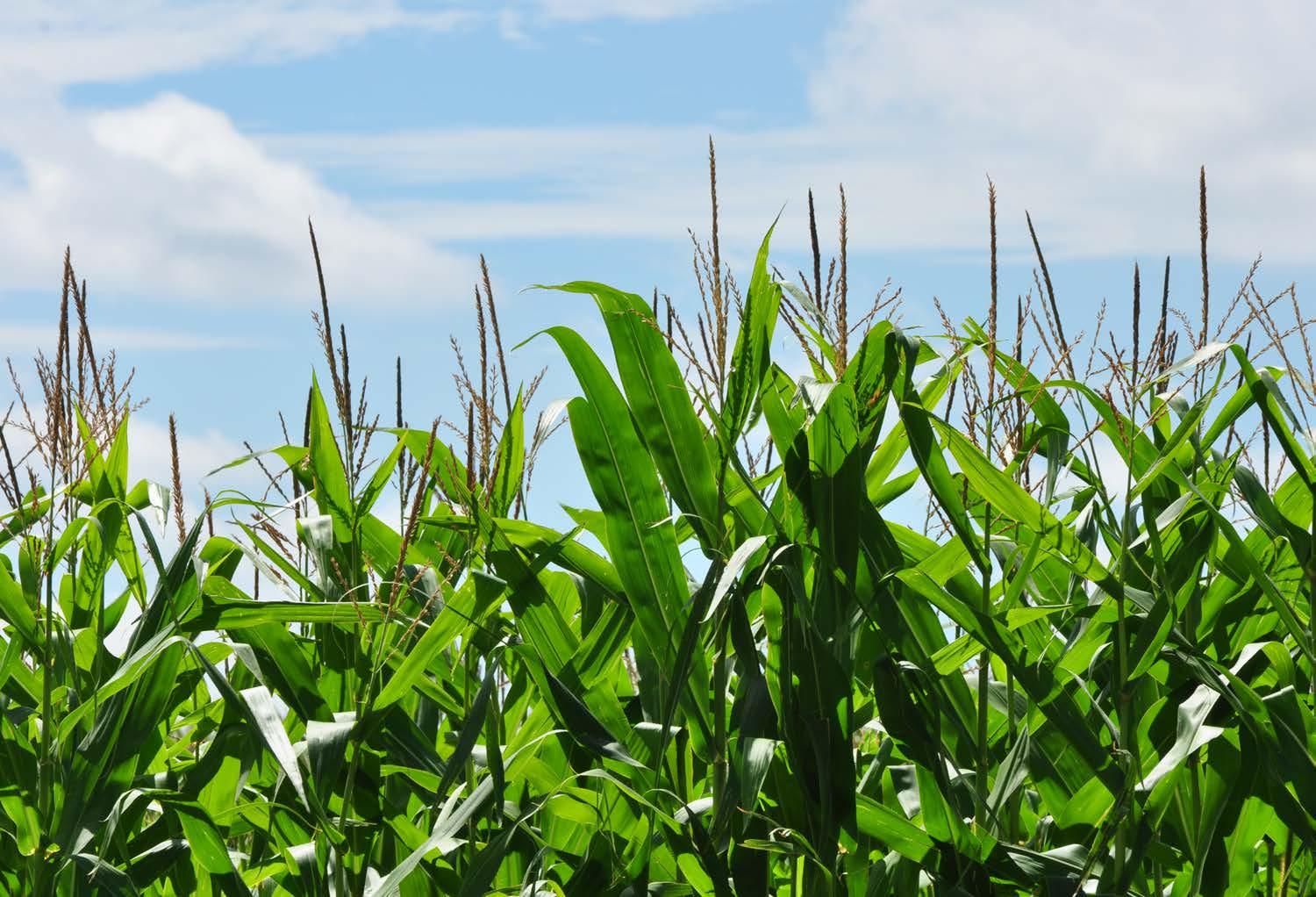
Andrew Mef ferd Agency
It can take quite a bit of research and time to find the best insurance policy to fit a client’s needs, but Andrew Mefferd said ensuring clients’ risks are well covered is well worth the time and effort.
“It is so rewarding to help someone,” Mefferd said. “This year, because of a health insurance policy I was able to find for a couple, they were able to retire. When we first sat down to visit, the wife explained that health insurance was the only reason they were not retired.”
Health insurance is among the many risk management products Mefferd is able to provide to clients. And due to a recent change in state retiree benefits, which did away with health insurance, access to health insurance in early retirement is in high demand.
Mefferd and his wife, Jessica, joined Farmers Union Insurance in 2015. Prior to becoming an insurance agent, Mefferd worked as a manager for Walmart. After learning about an opportunity to become an agent, Mefferd spent more than a
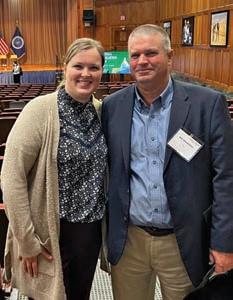
Today was a full circle moment for me as I, again, sat next to my dad in the Jefferson Auditorium at USDA. Eight years ago, on my first trip to Washington, D.C., I sat in this auditorium for my first National Farmers Union (USA) Fly-In. Today, as a policy adviser for USDA Farm Service Agency, I listened to Zach Ducheneaux, FSA Administrator, speak at the 2023 NFU Fly-In. I could have never dreamed that my first trip to D.C. would be the catalyst to me getting an internship on the hill the following semester, going to law school, and moving to D.C. to pursue a career in agricultural policy six years later.
– Kelcy Schaunaman, daughter of Farmers Union members Kirk and Kim Schaunaman ***
month researching the company. What he learned impressed him enough that both he and Jessica quit their jobs to become agents.
“I was impressed by what I learned about the Farmers Union culture. And becoming an agent gave me an opportunity to help people and be in control of my success,” Mefferd said.
And although the time he spends working has not decreased, because he sets his own schedule, he is able to give more time to his family and community. He and Jessica have four children: Lincoln, Natalie, Breckin and Lily.
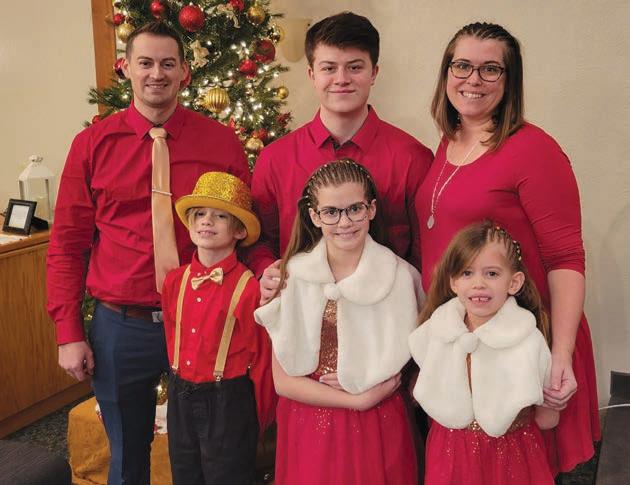
When they are not serving their clients, the couple can be found volunteering at their church, with the Pierre Chamber of Commerce, Meals on Wheels or raising funds for the local food bank. n
THAN K YOU
Thank you for helping with the farm safety camp and bringing the farm safety trailer again. We had a good turnout and we appreciate you all helping with the event.
With sincere thanks,
– Bon Homme County 4-H ***
Thank you for sponsoring the Heartland 4-H Rodeo.
– Avery Stevens ***
Thank you for sponsoring the Heartland 4-H Rodeo.

– Tia Esser ***
Thank you for sponsoring this rodeo. I love the buckle from all around the world.
– Ramsey Rouberg ***
Thank you for sponsoring the junior girls all around for the first-go! I really appreciate it. I had a really good day and weekend. It takes a lot of help and volunteers to be able to put
these on. Thanks again.
– Charlie Braun ***
Thank you for sponsoring the Quiz Bowl. We enjoyed getting the opportunity to complete and learn new things.
– Thank you, Wolsey-Wessington FFA ***
Thank you for sponsoring the shooting competitions at our state rodeo. I had a lot of fun competing this year and can’t wait to compete at nationals this year. Thanks again!
– Lydia Main ***
Thank you for sponsoring the awards at the state high school rodeo for trapshooting. I’m excited to represent South Dakota again in Gillette this year.
– Addison Ward ***
26 September/October 2023 www.sdfu.org
You
Thank
Andrew.Mefferd@fumic.com
Continued on Page 27 Contact Information:
605-224-8616
Andrew and Jessica Mefferd with their children.
Thank You Continued from Page 26
Thank you for sponsoring the SDHRSA light rifle competition! Your support of the rifle shooters means a lot to all of us. We are all excited to travel to Gillette, Wyo., for the national competition in July. Thank you again for all your support.
– Jenna Kruger ***
Thank you for supporting SDHSRA state finals light rifle competition! Thank you for supporting the competitors as they go to Gillette, Wyo.! We are all excited to go and represent South Dakota. Thank you again for your support for all of us.
– Mya Heinje ***
Thank you for supporting eminent domain reform legislation!
– Ed Fischbach, Kay Lapka, Kevin Lapka, Bev Nelson, Deb Ross, Jennifer Poindexter-Runge; Helen LeBrun, Carol Klein, Betty Strom, Bruce Burkhart, Glenn Scott, Rick Bonander, Rita Brown, Daryl Rippentrop, Linda Rippentrop, Crystal Page, Joy Hohn, Ernest Stratmeyer, Mark Lapka, Monica Mayer, Deb Ross ***

COOK’S CORNER
THAN K YOU
Thank you for the complimentary tickets to the South Dakota State Fair. We look forward to attending the fair each year and had a great time!
– Eric, Patti, Kade & Cooper Johnson Watertown, S.D. ***
Thank you for the complimentary gate tickets to the State Fair on Saturday, Farmers Union Day. My husband and I enjoyed the delicious Farmer’s Share Luncheon, which reminded us of how little the farmers actually profit from such a meal. We also attended the very informative panel discussion on “Eminent Domain vs Landowner’s Rights.” Thank you for making our day at the fair an enjoyable one!
Sincerely,
– Mrs. Darwin (Jean) Morrison ***
Thank you so much for supporting the Black Hills Farmers Market PRO-Tein Day!! We are very appreciative of farmer supporting farmer supporting our communities!
– Gwendolyn Kitzan, Black Hills Farmers Market
Cream Cheese Bars
2 tubes crescent rolls
12 oz. cream cheese, softened 1 egg, separated
1 1/4 c. sugar, divided 1 tsp. vanilla
Preheat oven to 350 degrees F. Lay one tube of crescent rolls in greased 9 x 13 pan. Mix cream cheese and 1 cup sugar together. Add vanilla and beaten egg yolk. Pour over rolls. Layer other tube of rolls over cream cheese mixture (press together the perforations). Beat egg white and spread on top. Sprinkle rest of sugar on top. Bake for 30 minutes or until golden brown.
4 Ways to Connect With Us! SOUTH DAKOTA
Like


SDFU CLIP AND SAVE CALENDAR

(SUBJECT TO CHANGE) October 3-7 Western Junior – Rapid City 7 District 3 Annual Meeting – Watertown 9 Office Closed – Native American Day 10 Clark Annual Meeting – Zoom 13 District 4 Annual Meeting – Gregory 13 Gregory Annual Meeting – Gregory 13 Tripp Annual Meeting – Wonnenberg Farm 16 District 6 Annual Meeting – Isabel 16 Dewey/Ziebach Annual Meeting – Isabel 18 Safety Trailer – Lemmon 28 District 1 Annual Meeting – Yankton November 8-9 SDFU Board Meetings 23-24 Office Closed – Thanksgiving 28-29 FUI Board Meeting – Redwood Falls, Minn. 30-Dec. 1 State Convention – Huron December 7-8 CHS Annual Meetings – Minneapolis 25-26 Office Closed – Christmas 2024 January 1 Office Closed – New Year’s Day 15 Office Closed – MLK Jr. Day 26-Feb. 3 Black Hills Stock Show February 13 Legislative Day – Pierre 19 Office Closed – President’s Day Union Farmer mail to: sdfu@sdfu.org
us for updates, photos, news, and so much more. https://www.facebook.com/ South-Dakota-Farmers-Union277721538812/
us for the latest legislative updates and news. https://twitter.com/sdfarmersunion
videos at the South Dakota Farmers Union Channel. https://www.youtube.com/ user/sdfarmersunion www.sdfu.org September/October 2023 27
Follow
View
Vicki Soren, Lake Preston, S.D. Lifetime Member
FARMERS UNION
BISON
BISON
BRITTON
BROOKINGS
YOUR FIRST CAR.


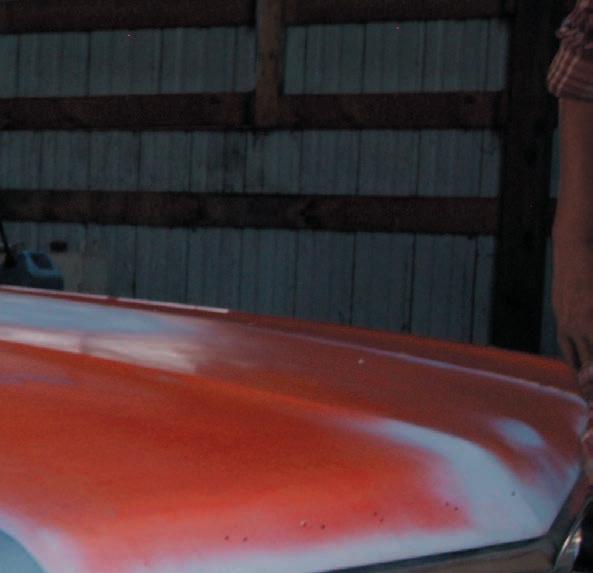

It might not have been perfect, but that didn’t matter. You loved it, because you worked hard for it, you took care of it, and it took care of you, your friends and maybe that someone special. And through it all your local Farmers Union Insurance Agent was there, working with you, for you, ensuring it was a smooth ride. Then and down the road.
More Choices | Great Rates | Local Agents
Simply Different | fumic.com




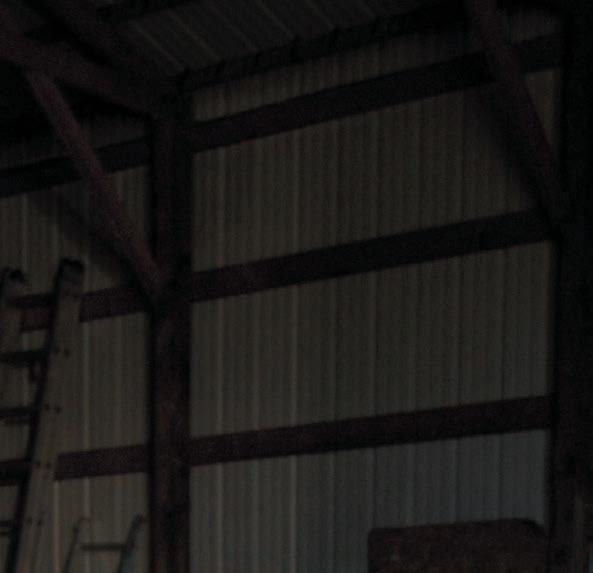
725-3003
ABERDEEN J.R. Johnson
229-3945
ABERDEEN Cameron Lux
244-7431
Alan Voller
244-7431
Karen Voller
448-5150
Tom Farber
BROOKINGS Gary Ray 692-6735
Matt Field 692-9224
881-2830
Jenn
375-3311
Lon Reidburn 532-3299
Mark Rozell 635-6511 FAULKTON Dawn Melius 598-6570 GROTON J.R. Johnson 397-8155 HURON Blaine Anderson 352-2130 IRENE Brendon Hansen 263-2121 IRENE Brian Hansen 263-3342 KADOKA Donna Enders 837-2144 LEMMON Chris Goldsmith 374-3462 MARION Kevin Albrecht 941-0650 MENNO Brendon Hansen 387-5555 MITCHELL David Schelske 660-2743 MITCHELL Zach Horstman 840-0440 PIEDMONT Ce Faulkner 737-0463 PIERRE Andrew Mefferd 224-4123 RAPID CITY Kasey Keller 343-4213 RAPID CITY Dan Lewis 342-3585 RAPID CITY Jake Lewis 342-3585 SALEM Kay Koch 777-0571 SIOUX FALLS Stacy Mongar 338-5302 SIOUX FALLS Grant Sjaarda 338-5302 SISSETON Erica Steiner 698-7316 SPEARFISH Scott Sabers 642-8870 STURGIS Scott Sabers 347-4507 WATERTOWN Todd Nichols 886-9683 WEBSTER Debbie Baumgarn 345-2640 WINNER Jeremy Clay 842-1556 YANKTON James Murphy 664-2121
BROOKINGS Heidi Fields
BUFFALO
Wickstrom
CLARK
DOLAND



















 South Dakota farmers and ranchers visit about Farm Bill priorities with Rep. David Scott, ranking member of House Ag Committee.
Sen. Mike Rounds meets with South Dakota Farmers Union members.
South Dakota farmers and ranchers visit about Farm Bill priorities with Rep. David Scott, ranking member of House Ag Committee.
Sen. Mike Rounds meets with South Dakota Farmers Union members.






























































































































